Thailand's Secret: How Bangkok Students Access €2,800 Monthly Ausbildung Salaries
Bangkok students unlock €2,800 monthly Ausbildung salaries in Germany. Thailand's secret pathway to German career success.

Table of Contents
- The Thai-German Education Bridge
- Why German Ausbildung Appeals to Thai Students Specifically
- Success Stories from Bangkok Universities Partnering with German Companies
- Economic Advantages: €2,800 vs. Typical Thai Graduate Salaries
- Understanding the German Ausbildung System
- What Makes Ausbildung Different from Traditional University Education
- Dual Education Model: Classroom Theory + Practical Workplace Training
- Most Popular Ausbildung Programs Among Thai Students
- The Bangkok Student Advantage
- How Thailand's Education System Prepares Students for German Standards
- Language Preparation Resources Available in Bangkok
- Cultural Adaptability Factors
- Financial Breakdown and Living Costs
- Monthly Ausbildung Salary Progression
- Cost of Living Comparison: German Cities vs. Bangkok
- Financial Planning Strategies for Thai Students
- Application Process from Thailand
- Step-by-Step Application Timeline for Thai Students
- Required Documentation and Certification Processes
- Visa Requirements and Embassy Procedures in Bangkok
- Overcoming Common Challenges
- Language Barrier Solutions and German Proficiency Requirements
- Cultural Adaptation Strategies for Thai Students
- Support Networks and Thai Communities in Germany
- Career Prospects and Long-term Benefits
- Post-Ausbildung Career Advancement Opportunities
- Pathways to Permanent Residency and Citizenship
- Salary Growth Potential in the German Job Market
- Getting Started: Your Action Plan
- Immediate Steps Thai Students Can Take Today
- Resources and Contacts in Bangkok for Guidance
- Timeline for Application and Preparation
- Frequently Asked Questions
- Question 1: What are the minimum German language requirements to start an Ausbildung program?
- Question 2: How much money do I need to save before moving to Germany for Ausbildung?
- Question 3: Can I apply for Ausbildung programs while still studying at a Bangkok university?
- Question 4: What happens if I don't perform well during the Ausbildung program?
- Question 5: How does the work schedule balance between company training and classroom education?
- Question 6: Are there specific Ausbildung programs that don't require strong technical backgrounds?
- Question 7: What career progression opportunities exist after completing Ausbildung?
- Question 8: How can I maintain connections with family and friends in Thailand while in Germany?
- Conclusion
Picture this: While your university classmates in Bangkok are competing for entry-level positions paying 15,000-25,000 THB monthly, you could be earning €2,800 (approximately 110,000 THB) as a qualified professional in Germany through the Ausbildung program. This isn't a distant dream—it's the reality for hundreds of Thai students who've discovered Germany's best-kept secret for international career advancement.
The German Ausbildung system, a unique blend of practical training and theoretical education, has quietly become the gateway for ambitious Thai students seeking financial independence and world-class professional skills. Unlike traditional university paths that often lead to oversaturated job markets, Ausbildung graduates enter industries with guaranteed employment and impressive starting salaries that can reach €2,800 monthly upon completion.
But here's what makes this opportunity particularly attractive for Thai students: Germany actively seeks international talent, and Thailand's strong educational foundation, coupled with Bangkok's growing network of German language preparation guide centers and cultural preparation programs, creates an ideal launching pad for this journey.
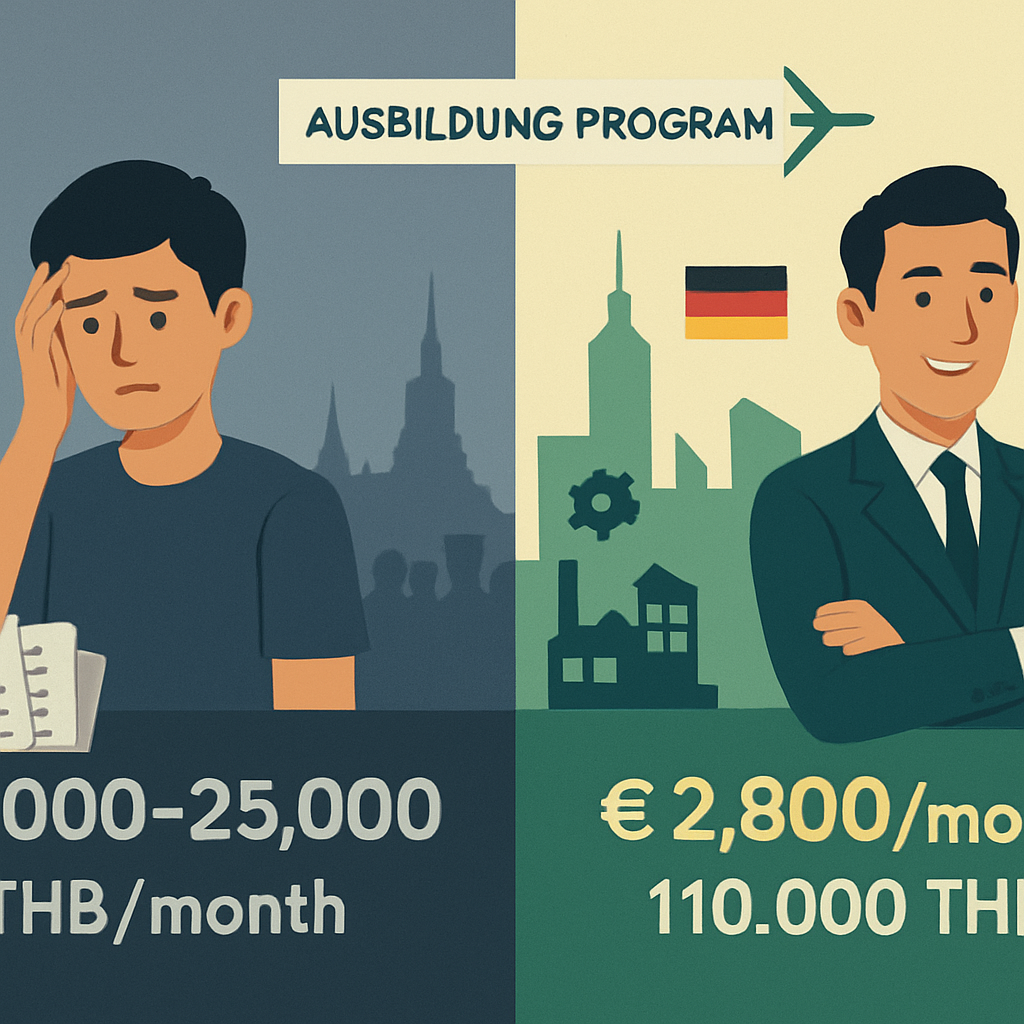
The challenge? Most Thai students remain unaware of this pathway or feel overwhelmed by the how the application process works. Many assume that studying in Germany requires perfect German language preparation guide skills from day one, or that the cultural transition would be insurmountable. Others worry about the financial investment required upfront, not realizing that Ausbildung students earn salaries from their very first month.
This comprehensive Ausbildung guide reveals exactly how Bangkok-based students are successfully navigating the Ausbildung application process, from initial preparation to landing high-paying positions in Germany's thriving economy. You'll discover the specific advantages Thai students possess, the step-by-step application process tailored for Bangkok residents, and real financial projections that demonstrate why this investment in your future pays dividends far beyond traditional education paths.
Whether you're a recent high school graduate or looking to pivot your career trajectory, understanding the Ausbildung opportunity could be the key to unlocking your international earning potential.
The Thai-German Education Bridge

The allure of German Ausbildung programs for Thai students extends far beyond just attractive salaries. For Bangkok's ambitious students, these vocational training opportunities represent a strategic pathway to economic mobility that traditional education routes in Thailand simply cannot match.
#
Why German Ausbildung Appeals to Thai Students Specifically
Thai students are increasingly drawn to German Ausbildung for several compelling reasons:
• Immediate earning potential: Unlike Thai university graduates who often face unemployment or low-paying entry positions, Ausbildung participants earn from day one
• Cultural alignment: Thai values of respect, discipline, and craftsmanship align perfectly with German work ethics
• Language advantage: Many Thai students already study English and find German more accessible than other European languages
• Clear career progression: The structured advancement system provides certainty that's often missing in Thailand's job market
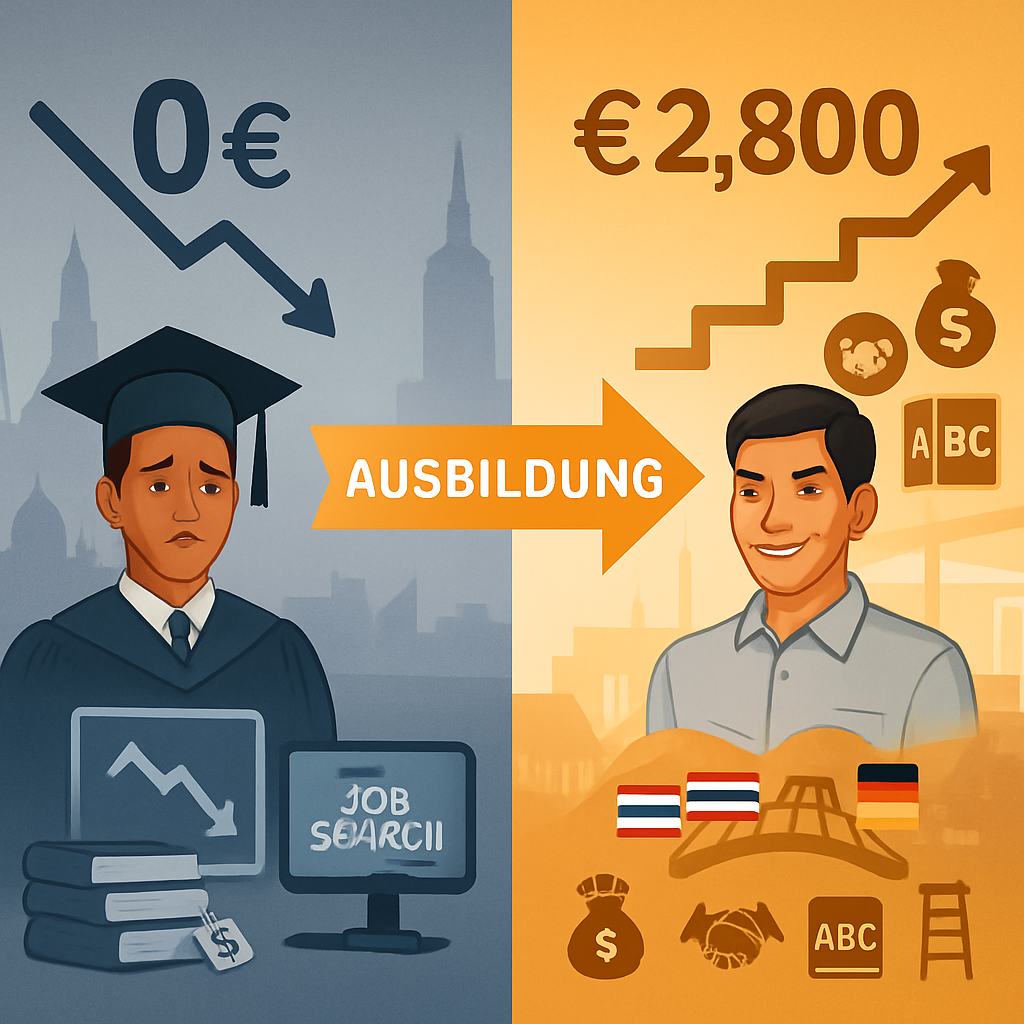
The appeal is particularly strong among students from middle-class Bangkok families who see their peers struggling with student debt and limited job prospects after traditional university education.
#
success stories from Bangkok Universities Partnering with German Companies
Several Bangkok institutions have established remarkable partnerships with German corporations:
Chulalongkorn University has partnered with Siemens Thailand to create a direct pipeline for engineering Ausbildung programs. Since 2019, over 150 students have successfully transitioned to Germany, with 95% completing their programs.
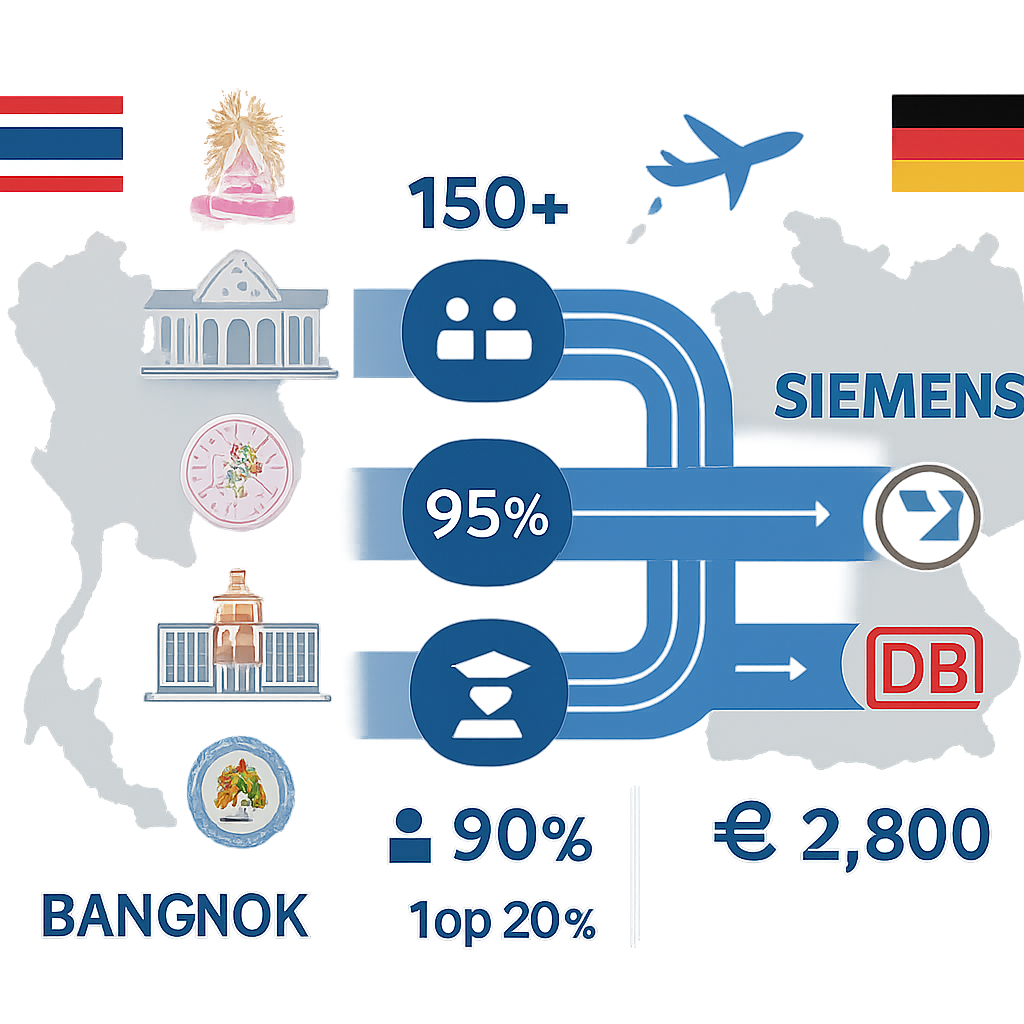
King Mongkut's Institute of Technology collaborates with BMW Group to offer automotive technology Ausbildung. Thai participants consistently rank among the top 20% of international trainees, with many securing permanent positions in Germany or leadership roles in BMW's Thai operations.
Assumption University has developed a unique pre-Ausbildung preparation program with Deutsche Bahn, focusing on transportation logistics. Students spend six months in intensive German language and cultural training before beginning their three-year programs in Germany.
#
Economic Advantages: €2,800 vs. Typical Thai Graduate Salaries
The financial comparison is striking and represents the primary motivation for most Thai students:
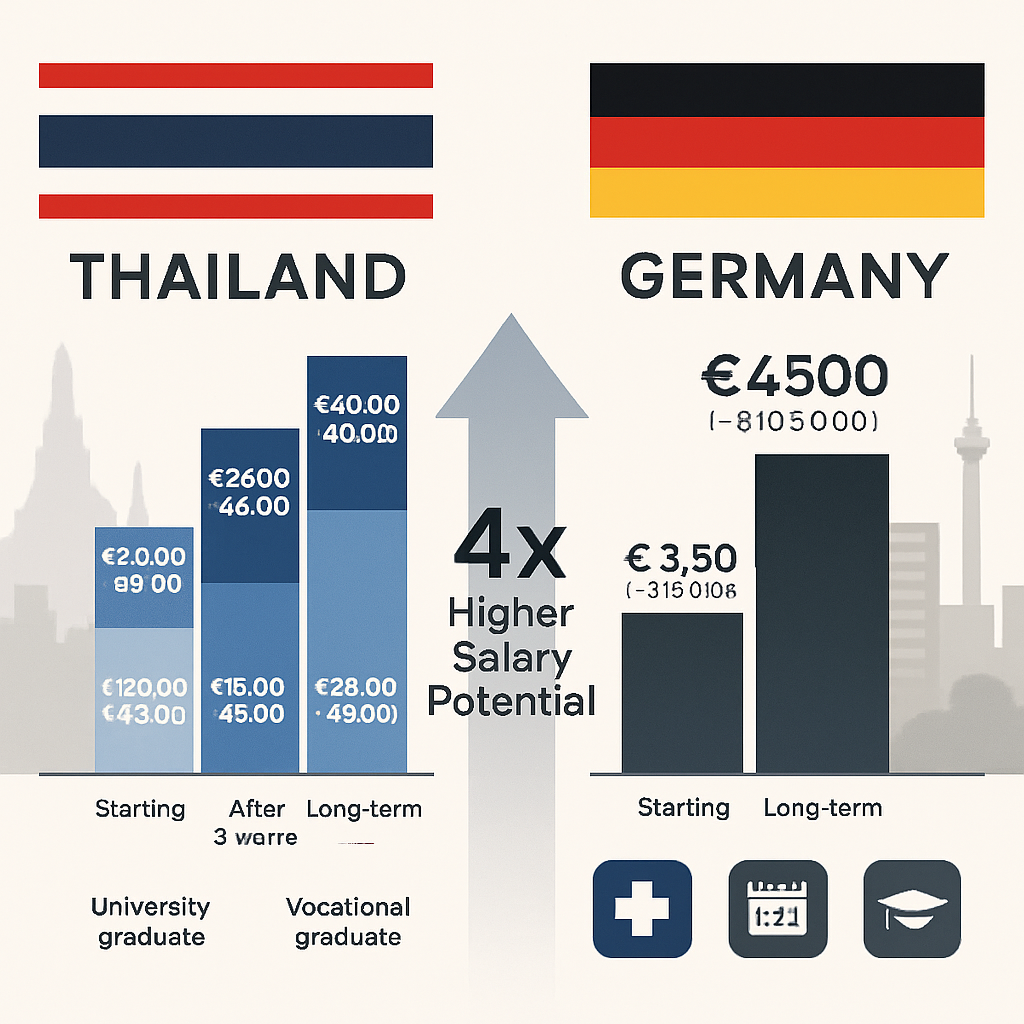
| Career Path | Starting Monthly Income | After 3 Years | Long-term Potential |
|---|---|---|---|
| German Ausbildung | €2,800 (~฿105,000) | €3,500+ (~฿131,000) | €4,500+ (~฿169,000) |
| Thai University Graduate | ฿15,000-25,000 | ฿25,000-35,000 | ฿40,000-60,000 |
| Thai Vocational Graduate | ฿12,000-18,000 | ฿18,000-28,000 | ฿30,000-45,000 |
Beyond raw salary figures, German Ausbildung offers additional economic benefits:
- Comprehensive health insurance and social security
- Paid vacation (25-30 days annually)
- Professional development funding
- Potential for permanent residency and EU citizenship
Understanding the German Ausbildung System
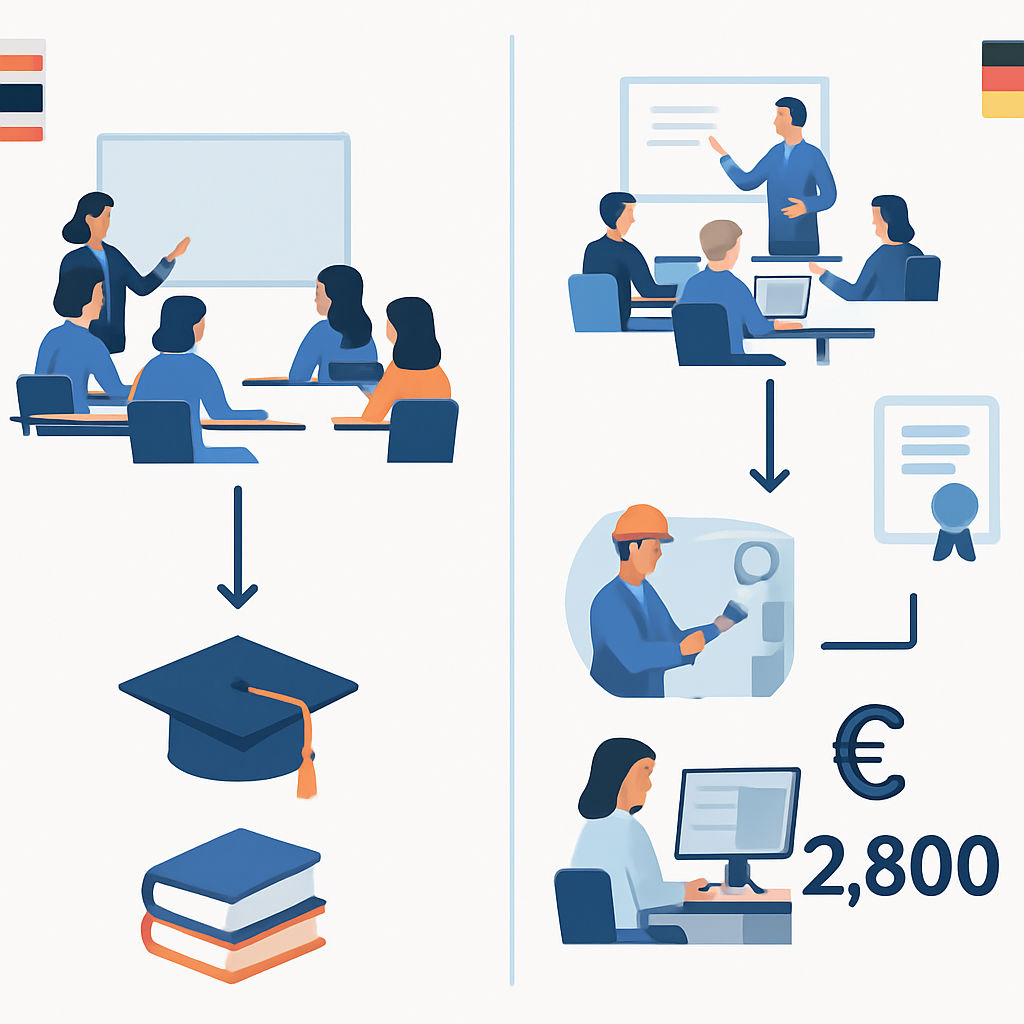
The German Ausbildung system represents a fundamentally different approach to professional education that has proven highly effective for international students, particularly those from Thailand seeking practical, career-focused training.
#
What Makes Ausbildung Different from Traditional University Education
Unlike conventional academic programs, Ausbildung prioritizes practical skills and immediate workplace application:
Traditional University Approach:
- Theoretical knowledge emphasis
- 3-4 years of classroom learning
- Limited practical experience
- Uncertain job prospects upon graduation

Ausbildung Approach:
- Skills-based learning with immediate application
- Guaranteed employment during training
- Direct mentorship from industry professionals
- Clear career pathway upon completion
This practical focus particularly appeals to Thai students who often find traditional academic programs disconnected from real-world job requirements.
#
Dual Education Model: Classroom Theory + Practical Workplace Training
The dual education system operates on a structured weekly schedule:
Typical Week Structure:
- 3-4 days: On-site workplace training with experienced professionals
- 1-2 days: Theoretical classroom instruction at vocational schools
- Evening hours: Language development and cultural integration support
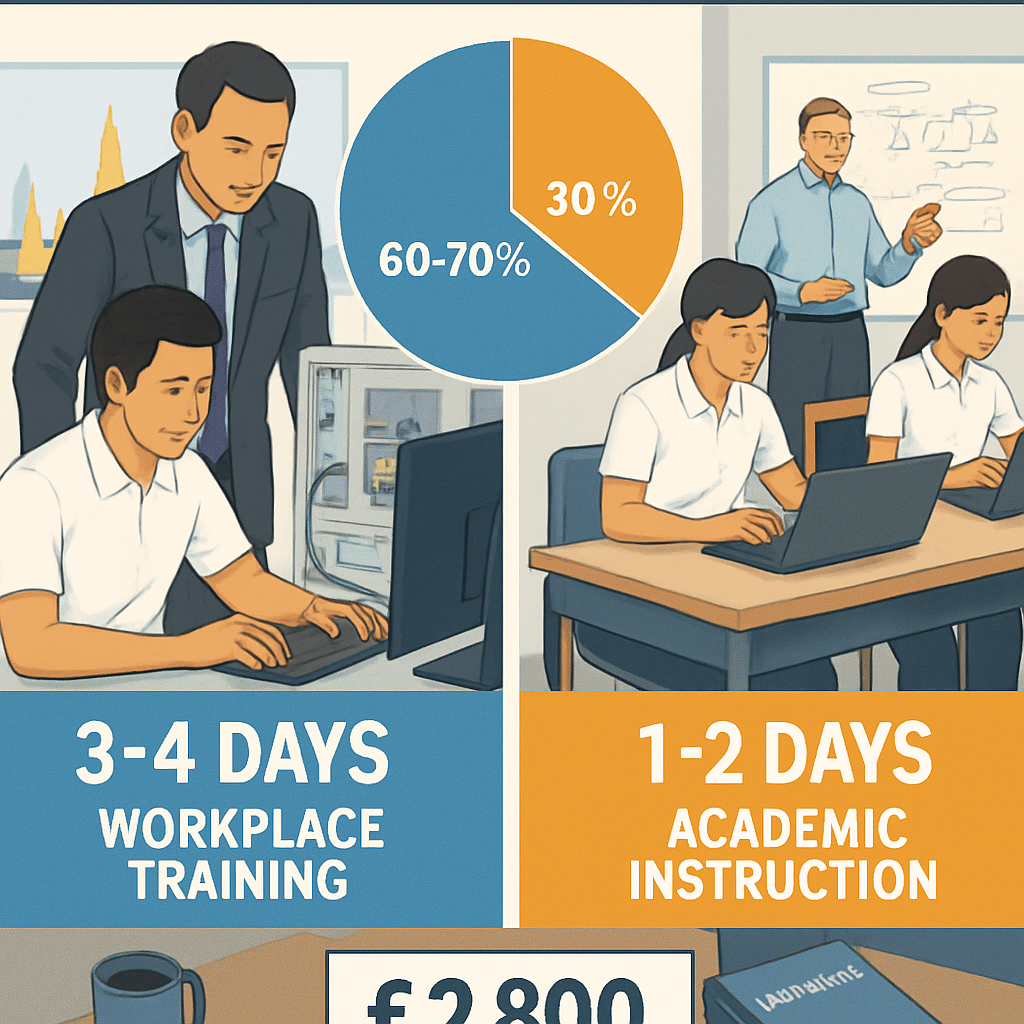
Training Components:
- Workplace Learning (60-70% of time)
- Hands-on skill development
- Real project participation
- Mentorship from German professionals
- Gradual increase in responsibility
- Academic Instruction (30-40% of time)
- Industry-specific theory
- German language advancement
- Business communication skills
- Technical certification preparation
- Industrial Mechanics (Industriemechaniker) - 28% of Thai participants
- Focus: Manufacturing, machinery maintenance
- Starting salary: €2,750-2,900
- High demand in automotive and aerospace sectors
- IT Systems Integration (Fachinformatiker) - 22% of Thai participants
- Focus: Network administration, software development
- Starting salary: €2,800-3,100
- Excellent progression to senior technical roles
- Logistics Specialist (Fachkraft für Lagerlogistik) - 18% of Thai participants
- Focus: Supply chain management, warehouse operations
- Starting salary: €2,650-2,850
- Strong demand due to e-commerce growth
- Hotel Management (Hotelfachmann/frau) - 16% of Thai participants
- Focus: Hospitality operations, guest services
- Starting salary: €2,500-2,700
- Leverages Thai cultural service orientation
- Banking (Bankkaufmann/frau) - 12% of Thai participants
- Focus: Financial services, customer relations
- Starting salary: €2,900-3,200
- Highest earning potential among popular programs
- Hierarchical respect systems similar to German workplace culture
- Technical subject emphasis in mathematics, sciences, and engineering
- Group project methodologies that mirror German collaborative work environments
- Punctuality and discipline ingrained through Thai educational institutions
- Goethe Institut Bangkok with specialized Ausbildung preparation courses
- German-Thai Chamber of Commerce language programs
- Private language schools offering intensive A1-B2 certification tracks
- University exchange programs with German institutions
- Native German speakers working in Bangkok's international business sector
- German cultural events and networking opportunities
- Access to German media and cultural immersion without leaving Thailand
- Cost-effective preparation (€200-400 for B1 certification vs. €800-1,200 in Europe)
- Service-oriented mindset aligning with German customer service standards
- Respect for craftsmanship inherent in Thai cultural traditions
- Adaptability to structured environments while maintaining creative problem-solving
- Work-life balance appreciation matching German employment culture
- IT/Software Development: Higher starting salaries (€650-750 first year)
- Healthcare/Nursing: Guaranteed progression with excellent job security
- Engineering/Manufacturing: Premium salaries in automotive regions
- Hospitality/Tourism: Lower entry but rapid advancement opportunities
- Initial Capital Requirements: €3,000-5,000 for first 3-6 months
- Emergency Fund: €1,500 minimum for unexpected expenses
- Documentation Costs: €500-800 for visa, translations, certifications
- Year 1 Strategy: Focus on survival and language improvement
- Year 2-3 Strategy: Build savings while improving qualifications
- Post-Qualification Planning: Leverage €2,800 salary for long-term wealth building
- Family financial support networks remain accessible
- Lower preparation costs compared to other international students
- Established Thai communities in German cities providing cost-sharing opportunities
- Currency exchange advantages during strong Thai Baht periods
- Break-even point: 8-12 months post-qualification
- 5-year earning potential: €140,000-170,000
- Lifetime career value increase: 300-500% compared to Bangkok-only career trajectory
- Research and select target Ausbildung programs
- Begin intensive German language preparation (aim for B1-B2 level)
- Contact German companies or training centers directly
- Gather academic transcripts and employment certificates
- Submit applications to multiple companies (recommended: 15-20 applications)
- Complete online assessments and video interviews
- Receive training contracts from interested employers
- Begin visa application preparation
- Finalize training contract with chosen employer
- Submit complete visa application to German Embassy Bangkok
- Arrange accommodation in Germany
- Complete medical examinations and insurance arrangements
- High school diploma (Matthayom 6) with official translation
- University transcripts (if applicable) certified by Ministry of Education
- English proficiency certificates (IELTS/TOEFL)
- German language certificates (Goethe Institut Bangkok)
- Valid passport (minimum 2 years remaining)
- Birth certificate with apostille certification
- Police clearance certificate from Royal Thai Police
- Medical examination results from approved clinics
- CV formatted according to German standards
- Motivation letter in German
- Letters of recommendation from teachers/employers
- Portfolio or work samples (for creative fields)
- Bank statements showing €8,000+ savings
- Scholarship letters (if applicable)
- Parental income statements with translations
- Online Appointment Booking: Schedule through the embassy website (typically 2-3 weeks wait time)
- Document Submission: Present all documents with Thai and English translations
- Interview Process: 15-20 minute interview in German/English about motivation and plans
- Processing Time: 4-8 weeks for standard applications
- Application fee: ฿4,500 (approximately €120)
- Biometric data collection mandatory
- Original documents must be presented
- Health insurance coverage proof required
- Submit applications during off-peak seasons (avoid July-September)
- Ensure all Thai documents have official translations
- Prepare for questions about return intentions to Thailand
- Maintain consistent communication with German employer during process
- Minimum Entry: B1 level (intermediate) for most programs
- Technical Fields: B2 level for engineering and healthcare
- Customer Service Roles: C1 level for hotel management and retail
- Structured Learning Path:
- Months 1-6: A1-A2 foundation at Goethe Institut Bangkok
- Months 7-12: B1-B2 intensive courses with German conversation groups
- Months 13-18: Specialized vocabulary for chosen field
- Immersive Techniques:
- Join Bangkok's German-Thai language exchange groups
- Watch German Netflix with Thai subtitles, gradually switching to German
- Practice with German volunteers at Thammasat University's language center
- Goethe Institut Bangkok: ฿25,000 for complete A1-B2 program
- Private tutoring with German expats: ฿800-1,200/hour
- Online platforms (Babbel, Deutsche Welle): ฿500/month
- Professional Behavior:
- Maintain eye contact during conversations
- Ask clarifying questions when instructions are unclear
- Participate actively in team meetings and discussions
- Social Integration:
- Join company sports teams or social activities
- Attend local festivals and community events
- Learn regional dialects and expressions
- Berlin: 3,500+ Thai residents with active student associations
- Munich: Strong Thai professional network in automotive and engineering
- Hamburg: Maritime industry connections and cultural organizations
- Frankfurt: Financial sector Thai professionals and families
- Academic Support:
- Thai Student Association Germany (TSAG) mentorship programs
- Study groups through Thai Buddhist temples
- Academic tutoring through university Thai societies
- Professional Networks:
- Thai-German Business Association career guidance
- LinkedIn groups for Thai professionals in Germany
- Industry-specific networking events in major cities
- Cultural Connections:
- Thai temples offering language and cultural classes
- Thai restaurants serving as community gathering points
- Annual Thai festivals and cultural celebrations
- Thai Embassy Germany 24/7 hotline: +49-30-794-810
- Thai community WhatsApp groups for immediate assistance
- German-speaking Thai volunteers in major cities
- Years 1-2 Post-Graduation: Junior specialist positions (€3,200-€3,800 monthly)
- Years 3-5: Senior technician/specialist roles (€4,200-€5,500 monthly)
- Years 6-10: Team leader/department supervisor (€5,800-€7,200 monthly)
- 10+ Years: Management positions (€7,500+ monthly)
- During Ausbildung: Student residence permit (renewable annually)
- Post-graduation: 18-month job search visa automatically granted
- Employment: Work residence permit (initially 2-4 years)
- After 5 years: Permanent residency (Niederlassungserlaubnis)
- After 8 years: German citizenship eligibility
- Continuous legal residence for 5 years
- B1-level German proficiency
- Financial stability (easily met with Ausbildung salaries)
- Clean criminal record
- Basic knowledge of German legal system
- EU passport allowing work in 27 countries
- Visa-free travel to 190+ destinations
- Access to German social security system
- Right to vote and political participation
- Experience Level: 3-5% annual increases typical
- Additional Certifications: 10-20% salary bumps
- Industry Demand: High-demand sectors see 15-30% premiums
- Geographic Location: Munich/Frankfurt offer 20-25% higher salaries than national average
- Technology/IT: €45,000-€85,000 annually
- Engineering: €48,000-€90,000 annually
- Healthcare: €42,000-€75,000 annually
- Finance: €50,000-€95,000 annually
- Language Foundation
- Enroll in Goethe Institute Bangkok (Sathorn Road location)
- Target A2 level German minimum for applications
- Download Duolingo, Babbel, or Deutsche Welle apps for daily practice
- Join Bangkok German Language Meetup groups
- Academic Preparation
- Obtain official transcripts with English translations
- Research recognition requirements for Thai educational credentials
- Prepare portfolio showcasing relevant projects or work experience
- Financial Planning
- Open savings account for €10,000 blocked account requirement
- Research scholarship opportunities through DAAD Bangkok
- Calculate total costs including visa fees, travel, and initial living expenses
- German Embassy Bangkok: 9 South Sathorn Road, Silom, Bangrak
- Visa consultation hours: Monday-Friday, 8:30-11:30 AM
- Phone: +66 2 287 9000
- Goethe Institute Bangkok: 18/1 Soi Goethe, Sathorn Road
- German language courses and cultural programs
- Study abroad counseling services
- DAAD Information Center Bangkok: Chulalongkorn University
- Free consultation for German study programs
- Scholarship application assistance
- Study in Germany Consultants: Multiple locations in Bangkok
- Specialized Ausbildung program guidance
- Application process support
- Thai-German Chamber of Commerce:
- Networking events with German companies
- Job placement assistance
- Industry insights and connections
- German language study (target A2-B1 level)
- Research programs and companies
- Begin document preparation
- Financial planning and savings
- Submit Ausbildung applications (deadline typically December-February)
- Complete language certifications
- Prepare for potential interviews (often conducted via video call)
- Apply for student visa
- Visa processing (typically 6-8 weeks)
- Housing arrangements in Germany
- Travel preparations and cultural orientation
- Final German language intensive course
- Arrive in Germany 2-4 weeks before program start
- Complete residence registration and administrative tasks
- Begin Ausbildung program
- Cultural adaptation and networking
- October-December: Research and shortlist programs
- January-March: Submit applications
- April-June: Interview period and acceptance notifications
- July-August: Visa applications and approvals
- September: Program commencement (most common start date)
#
Most Popular Ausbildung Programs Among Thai Students
Based on 2023 enrollment data, Thai students gravitate toward specific sectors:
Top 5 Programs by Thai Participation:
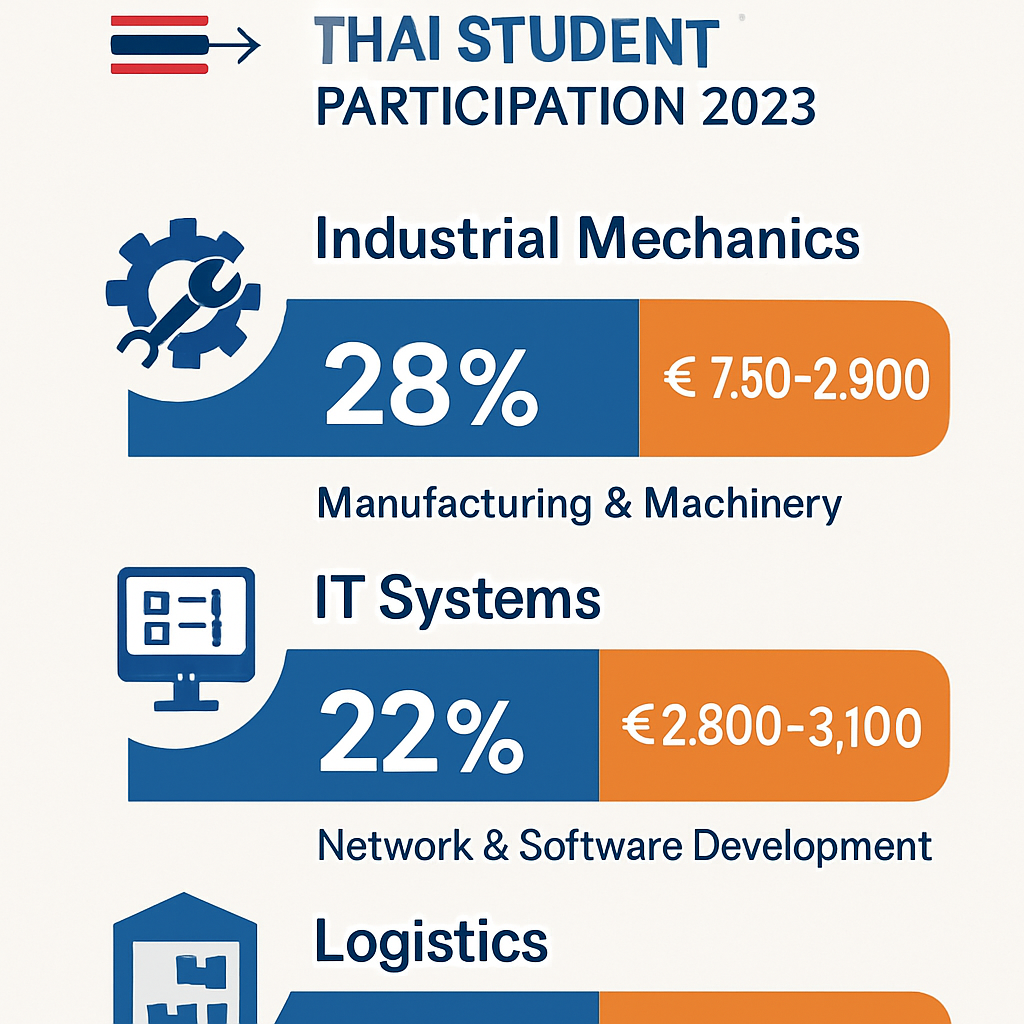
Each program includes specialized German language training relevant to the industry, ensuring Thai students can communicate effectively in professional settings from the beginning of their training.
The Bangkok Student Advantage
Bangkok students possess unique advantages that position them exceptionally well for German Ausbildung programs, creating a competitive edge over applicants from other regions.
#
How Thailand's Education System Prepares Students for German Standards
Thailand's education system, particularly in Bangkok's international schools and universities, emphasizes technical precision and structured learning approaches that align remarkably well with German educational philosophy. Bangkok students are accustomed to:
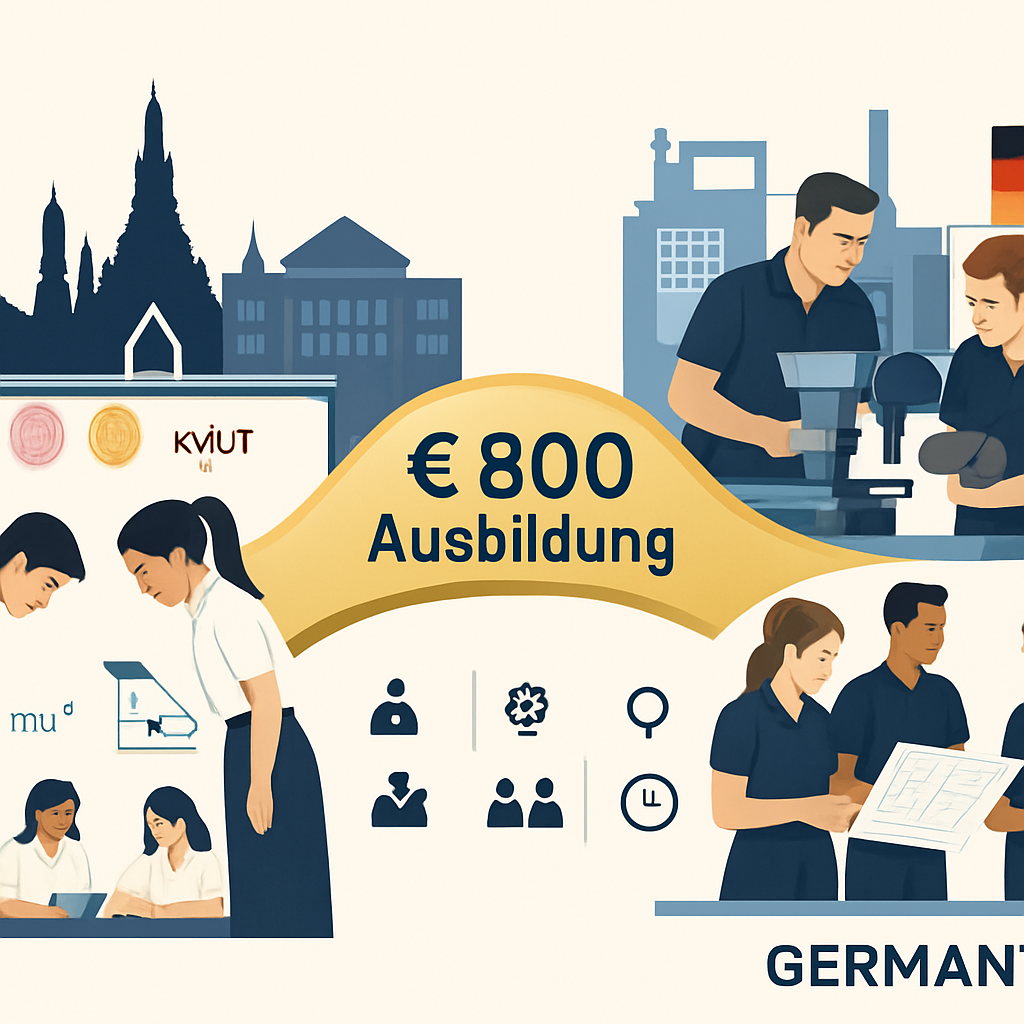
Bangkok's top-tier universities like Chulalongkorn, Thammasat, and KMUTT have already integrated European-standard curricula, making the transition to German technical training smoother than students from less internationally-oriented educational backgrounds.
#
Language Preparation Resources Available in Bangkok
Bangkok offers unparalleled German language learning infrastructure in Southeast Asia:
Institutional Resources:
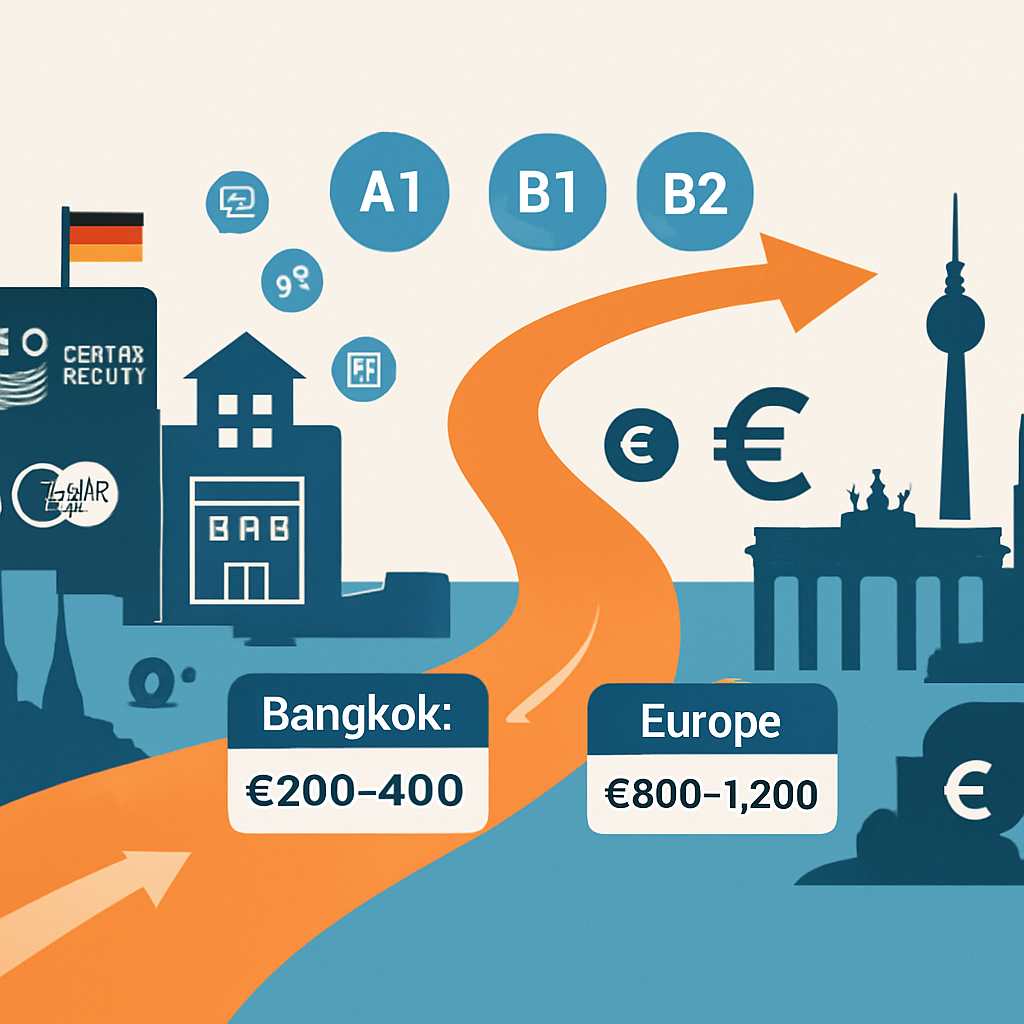
Practical Advantages:
#
Cultural Adaptability Factors

Thai students demonstrate exceptional cultural adaptability that German employers specifically value:
Financial Breakdown and Living Costs

Understanding the financial landscape is crucial for Bangkok students considering German Ausbildung programs.
#
Monthly Ausbildung Salary Progression
German Ausbildung salaries follow a structured progression model:
| Year | Monthly Salary Range | Annual Equivalent |
|---|---|---|
| Year 1 | €515 - €650 | €6,180 - €7,800 |
| Year 2 | €650 - €750 | €7,800 - €9,000 |
| Year 3 | €750 - €850 | €9,000 - €10,200 |
| Post-Qualification | €2,200 - €2,800 | €26,400 - €33,600 |
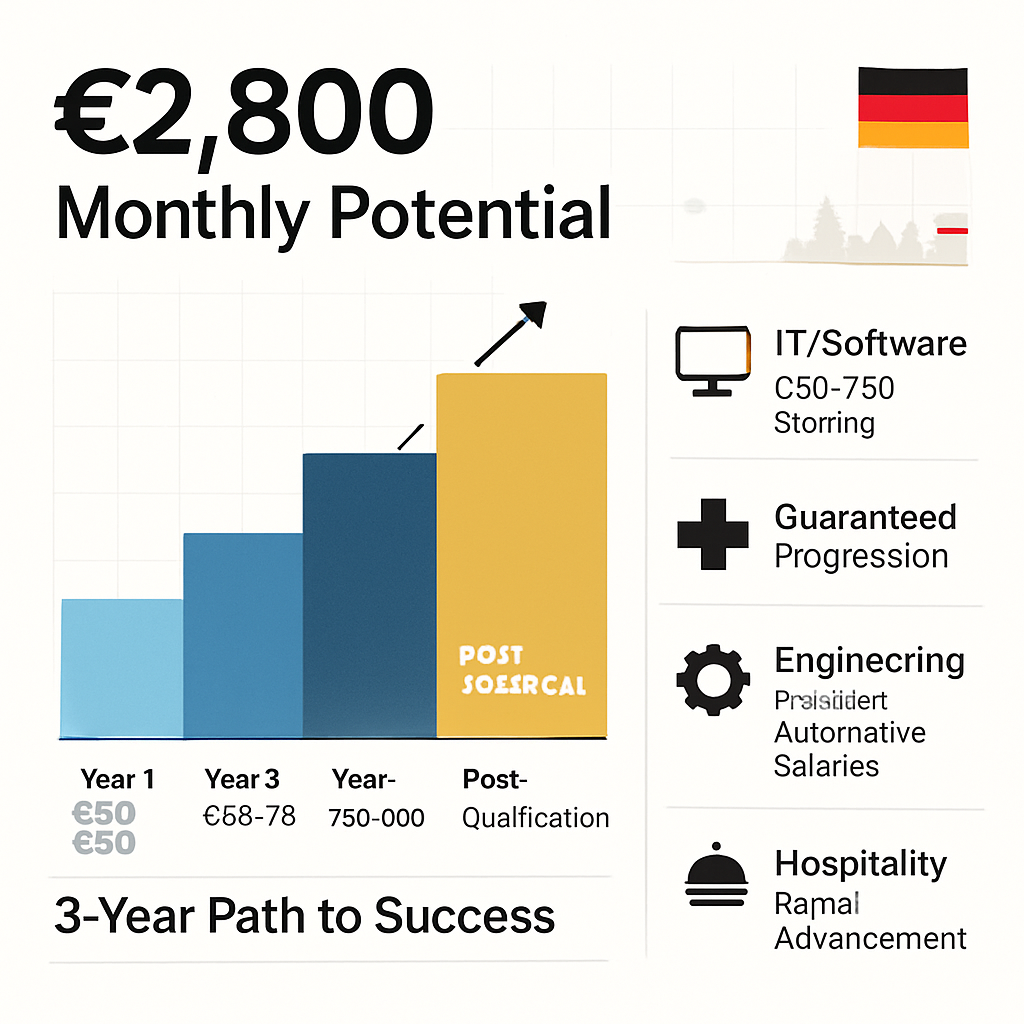
Sector-Specific Variations:
#
Cost of Living Comparison: German Cities vs. Bangkok
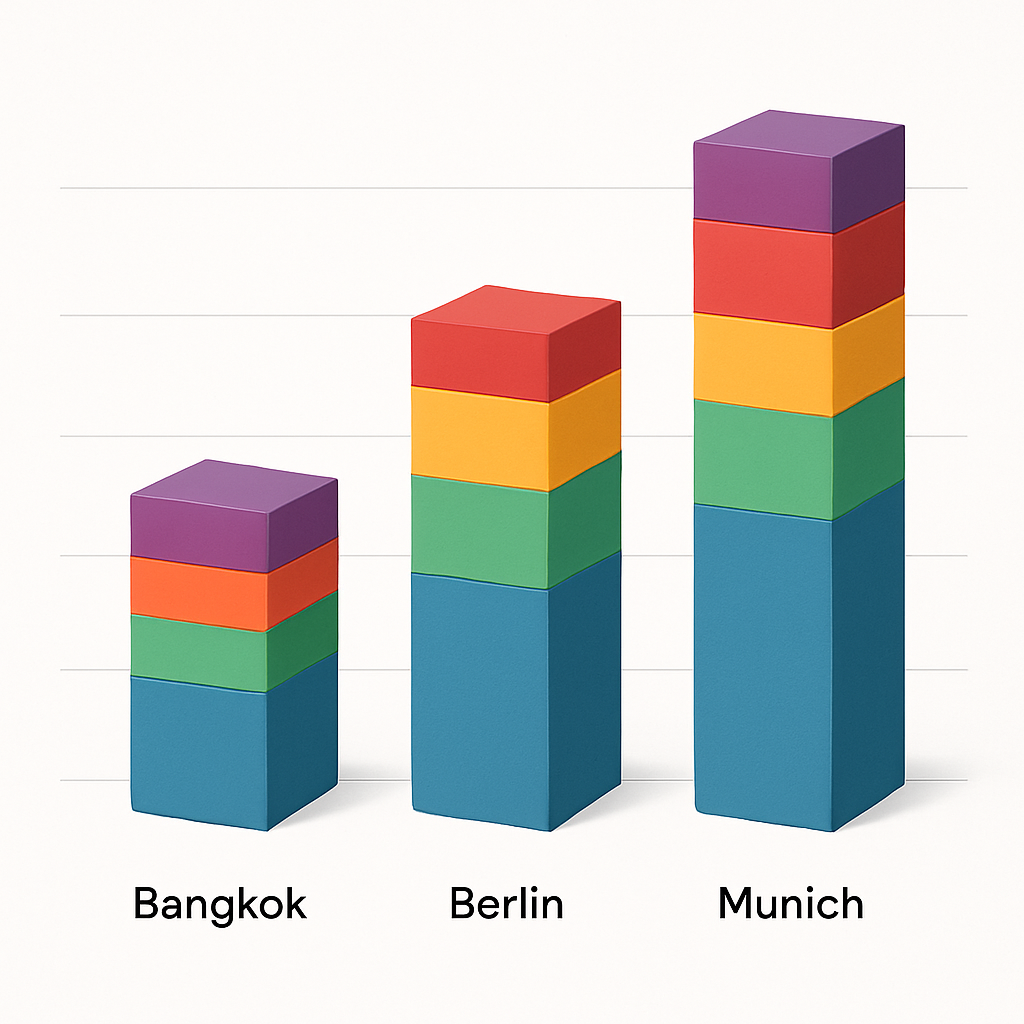
| Expense Category | Bangkok (Monthly) | Berlin (Monthly) | Munich (Monthly) |
|---|---|---|---|
| Accommodation | €200-400 | €400-600 | €600-800 |
| Food | €150-250 | €250-350 | €300-400 |
| Transportation | €30-50 | €80-100 | €60-80 |
| Healthcare | €20-40 | €100-150 | €100-150 |
| Entertainment | €100-200 | €150-250 | €200-300 |
| Total | €500-940 | €980-1,450 | €1,260-1,730 |
#
Financial Planning Strategies for Thai Students
Pre-Departure Financial Preparation:
During Ausbildung Financial Management:
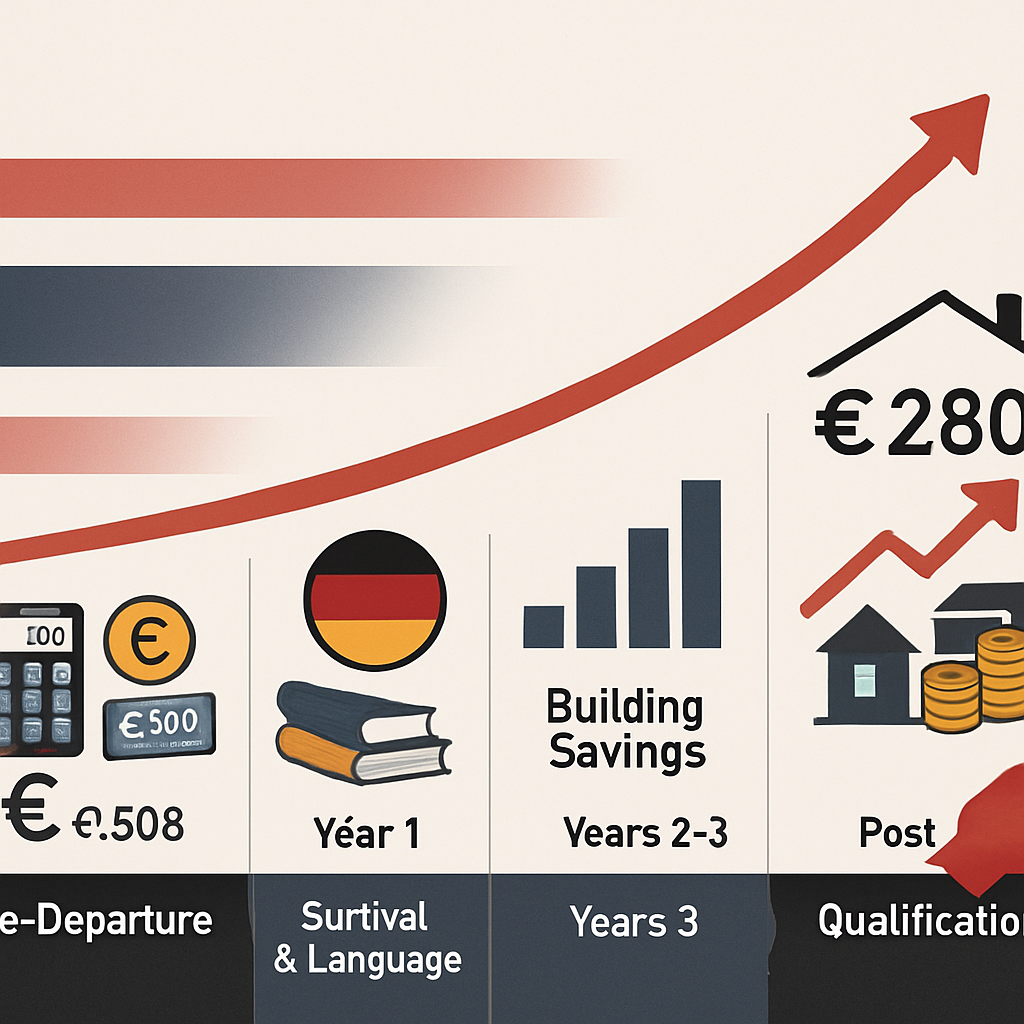
Bangkok-Specific Advantages:
Return Investment Calculation:
A Bangkok student investing €15,000 in German Ausbildung preparation and initial costs can expect:
This financial framework demonstrates why Bangkok students increasingly view German Ausbildung as their optimal career investment strategy.
Application Process from Thailand
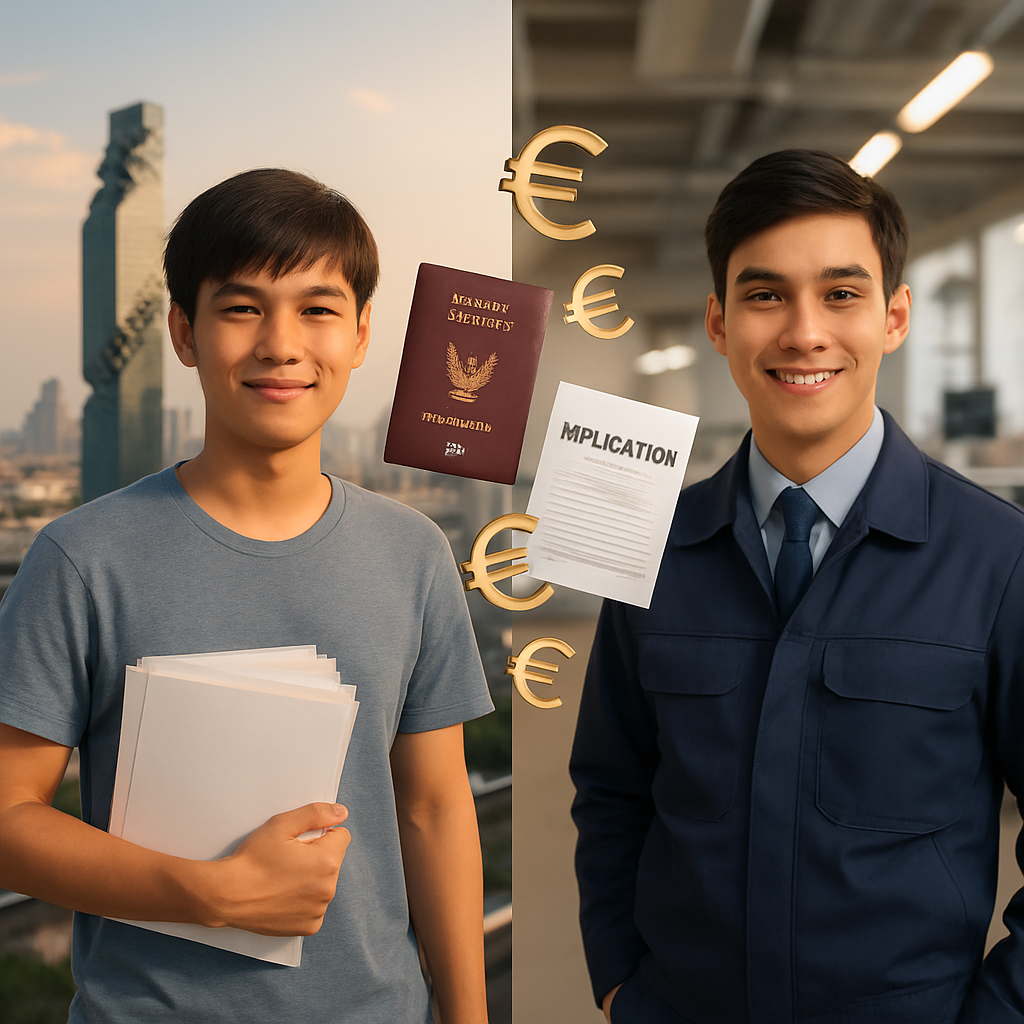
#
Step-by-Step Application Timeline for Thai Students
The journey from Bangkok to a German Ausbildung position requires careful planning and timing. Here's the comprehensive timeline Thai students should follow:
12-18 Months Before Start Date:
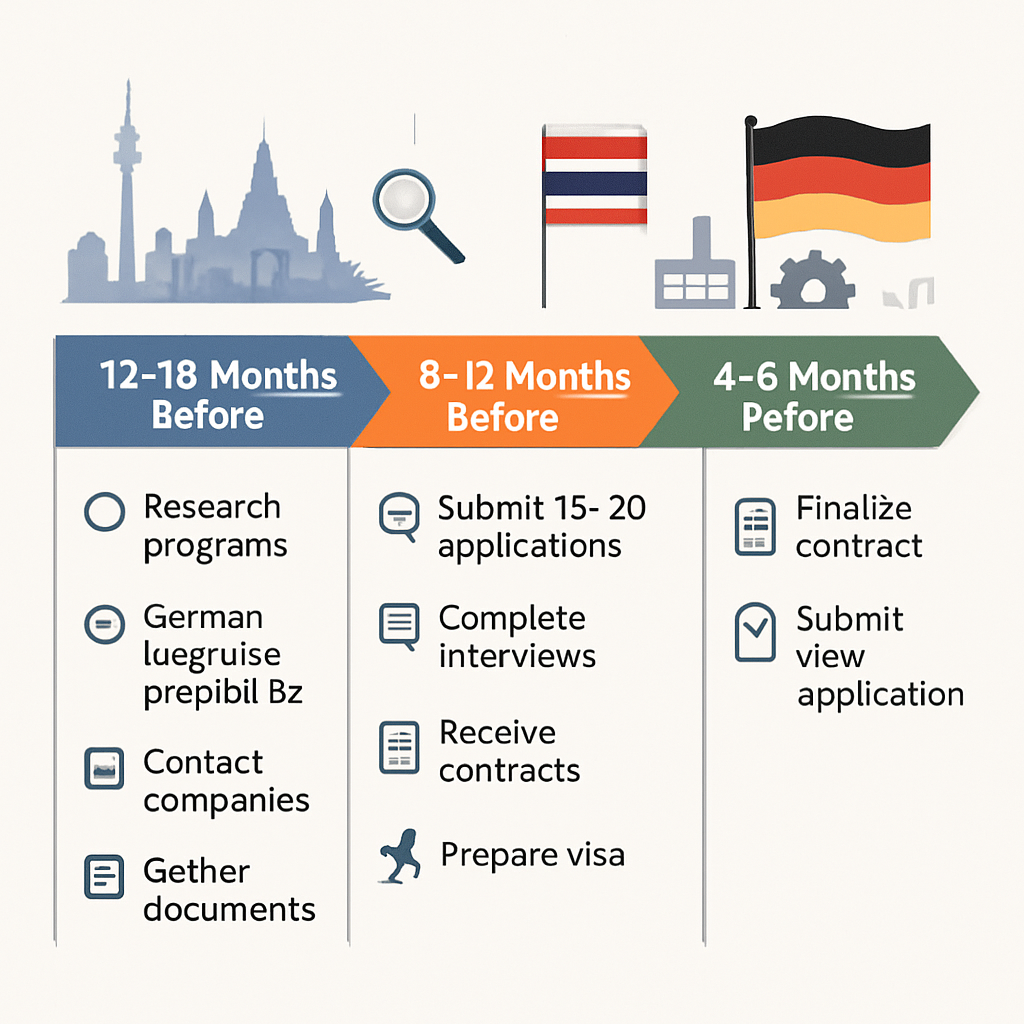
8-12 Months Before:
4-6 Months Before:
#
Required Documentation and Certification Processes
Thai students must prepare a comprehensive documentation package:
Academic Documents:
Legal Documentation:
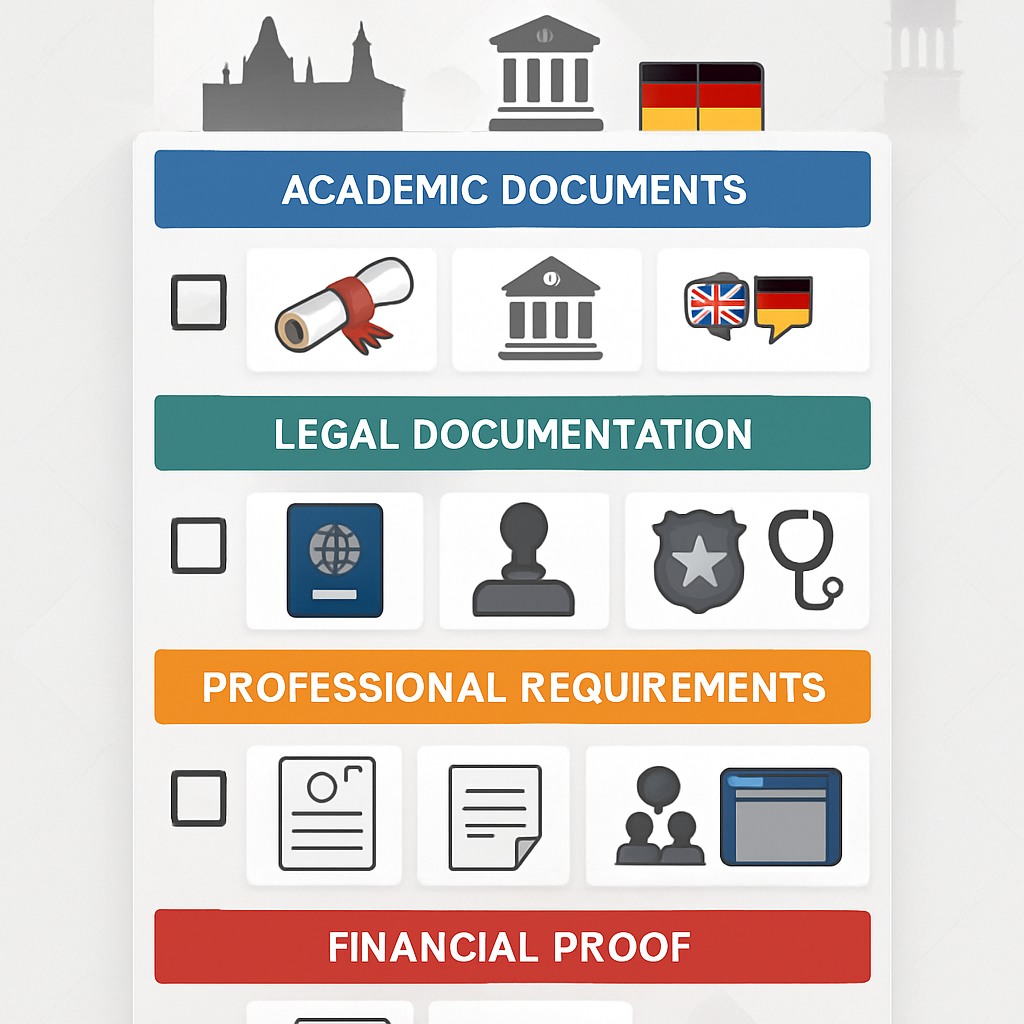
Professional Requirements:
Financial Proof:
#
Visa Requirements and Embassy Procedures in Bangkok
The German Embassy in Bangkok processes approximately 200 Ausbildung visa applications annually from Thai students.
Visa Application Process:
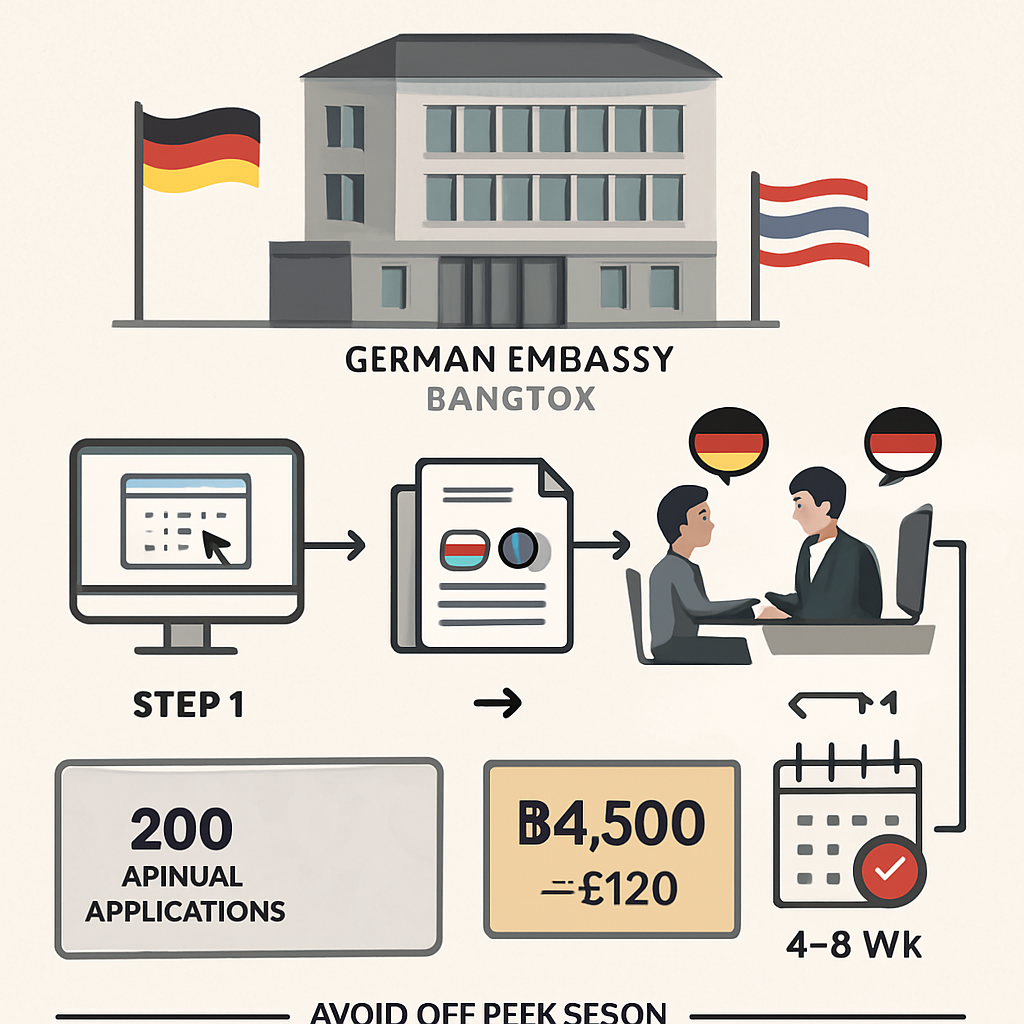
Embassy Requirements:
Success Tips for Bangkok Applicants:
Overcoming Common Challenges
#
Language Barrier Solutions and German Proficiency Requirements
The language barrier represents the most significant hurdle for Thai students entering German Ausbildung programs. However, systematic preparation can transform this challenge into a manageable stepping stone.
Required Proficiency Levels:
Effective Learning Strategies for Thai Students:
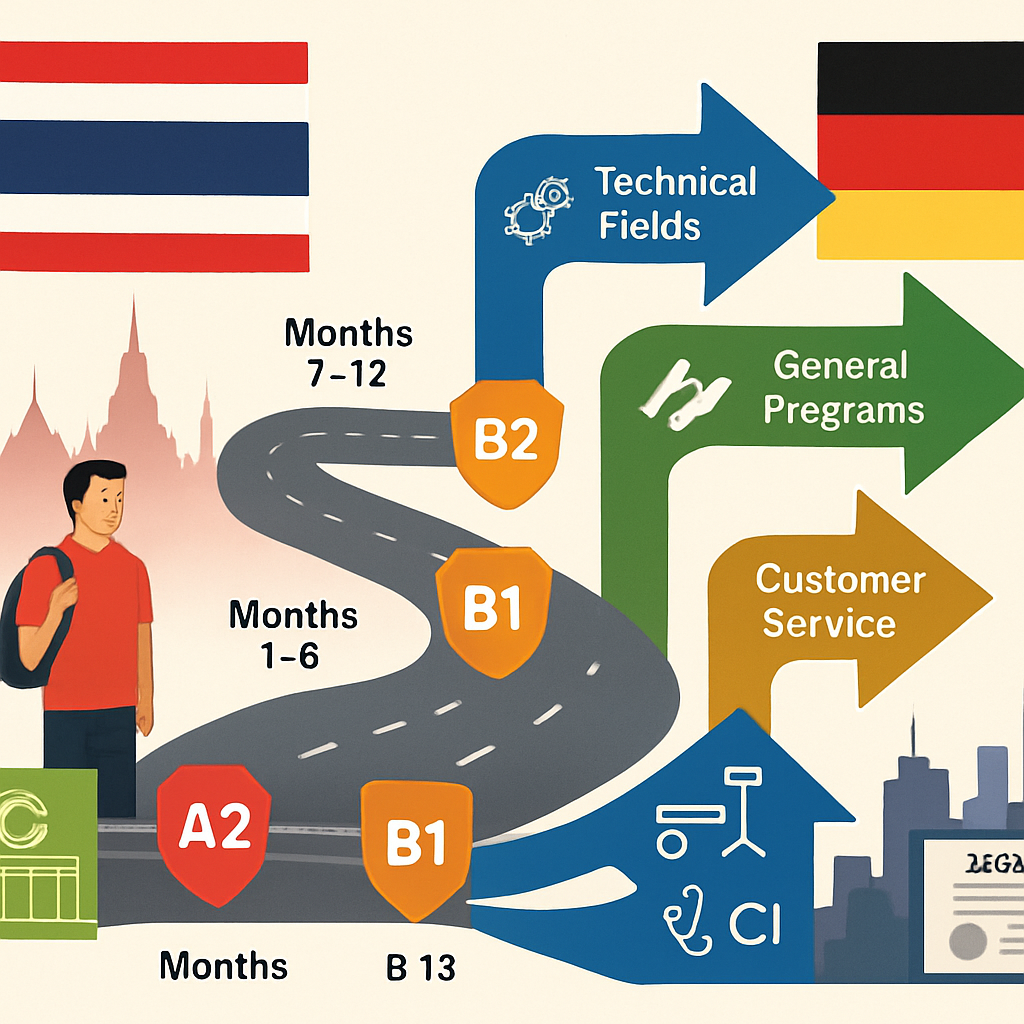
Cost-Effective Learning Options:
#
Cultural Adaptation Strategies for Thai Students
German workplace culture differs significantly from Thai professional environments, requiring specific adaptation strategies.
Key Cultural Differences:
| Thai Culture | German Culture | Adaptation Strategy |
|---|---|---|
| Indirect communication | Direct feedback | Practice assertive communication |
| Hierarchical respect | Flat organizational structure | Engage actively with supervisors |
| Group harmony priority | Individual accountability | Take personal responsibility |
| Flexible time concepts | Strict punctuality | Arrive 10 minutes early always |
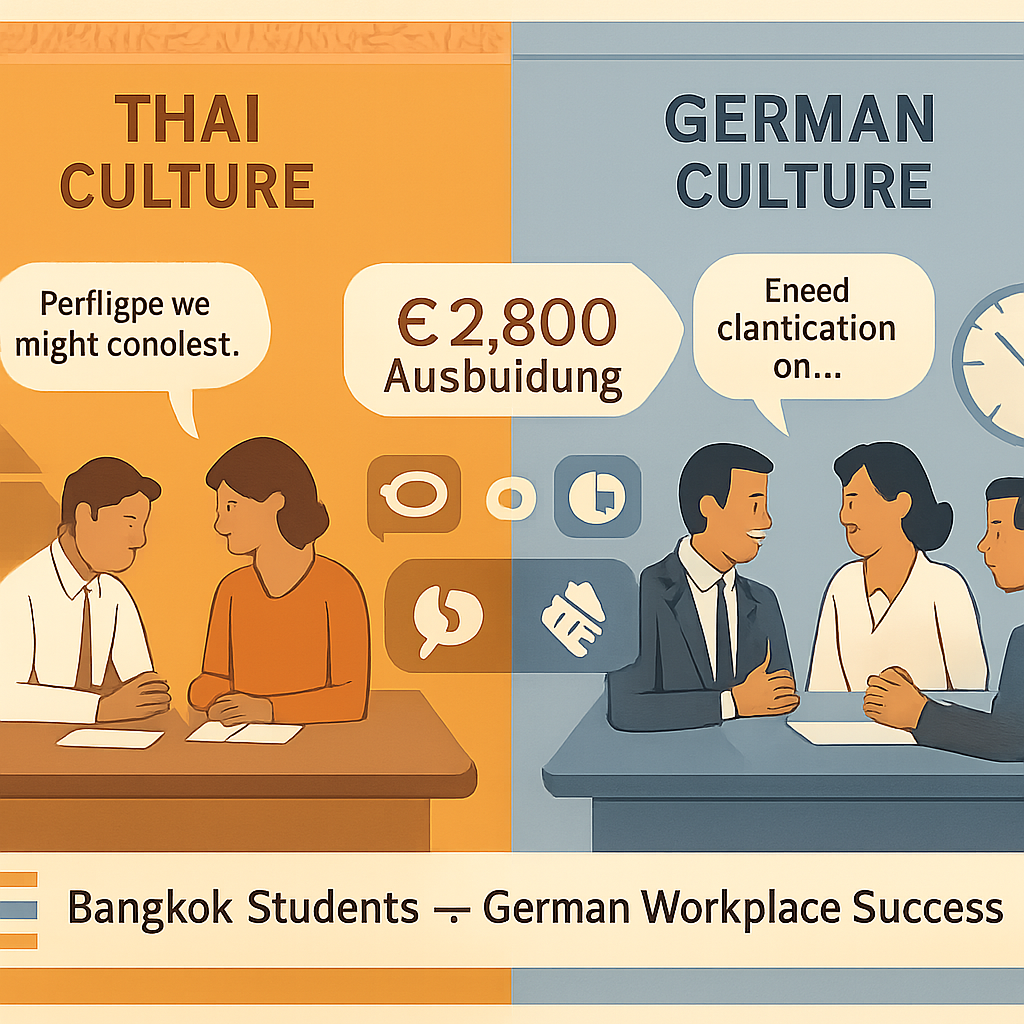
Practical Adaptation Steps:
#
Support Networks and Thai Communities in Germany
Established Thai communities across Germany provide crucial support systems for newcomers.
Major Thai Communities by Region:
Support Resources:
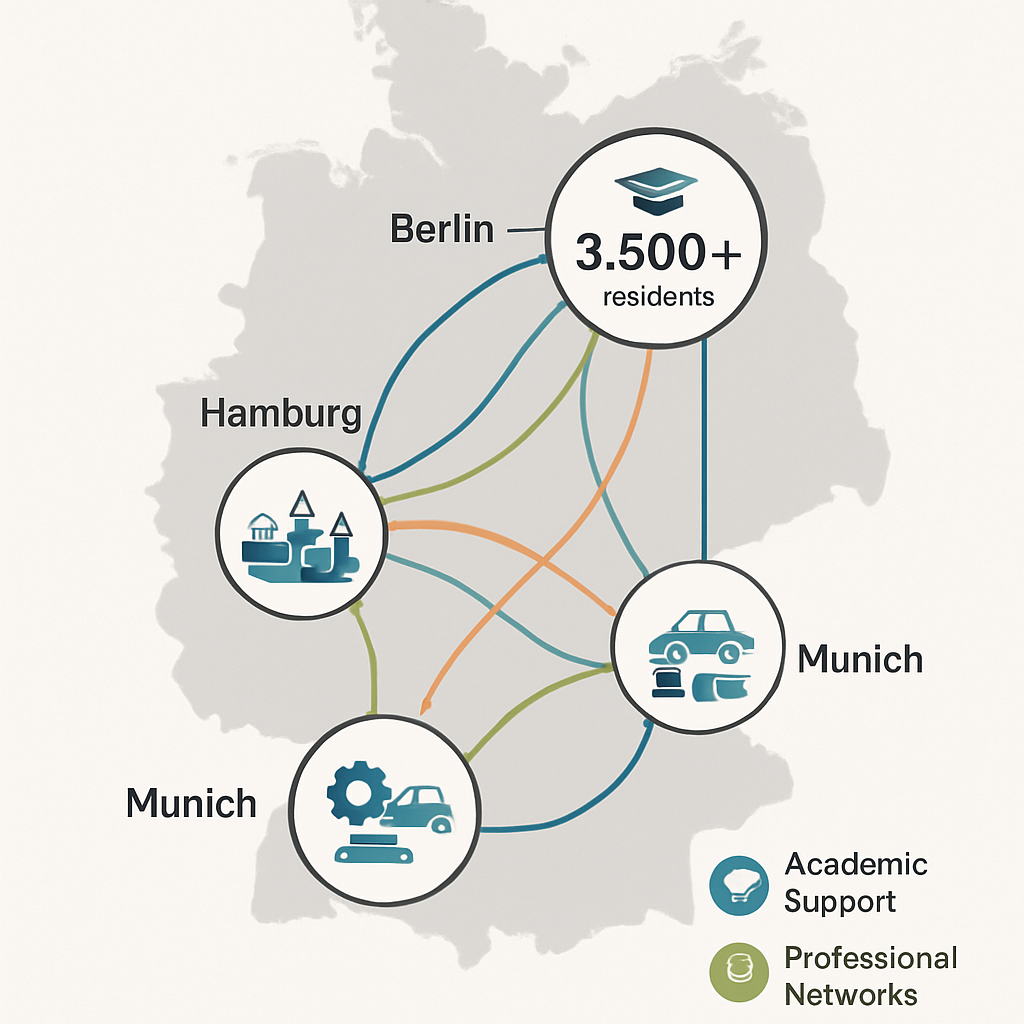
Emergency Support Systems:
These support networks report that students who actively engage within their first three months show 85% higher completion rates in their Ausbildung programs.
Career Prospects and Long-term Benefits
#
Post-Ausbildung Career Advancement Opportunities
German Ausbildung graduates enjoy exceptional career mobility within the EU's largest economy. Unlike traditional university degrees, vocational training provides immediate industry recognition and practical skills that German employers highly value.
Career Progression Timeline:
Industry-Specific Advancement Examples:
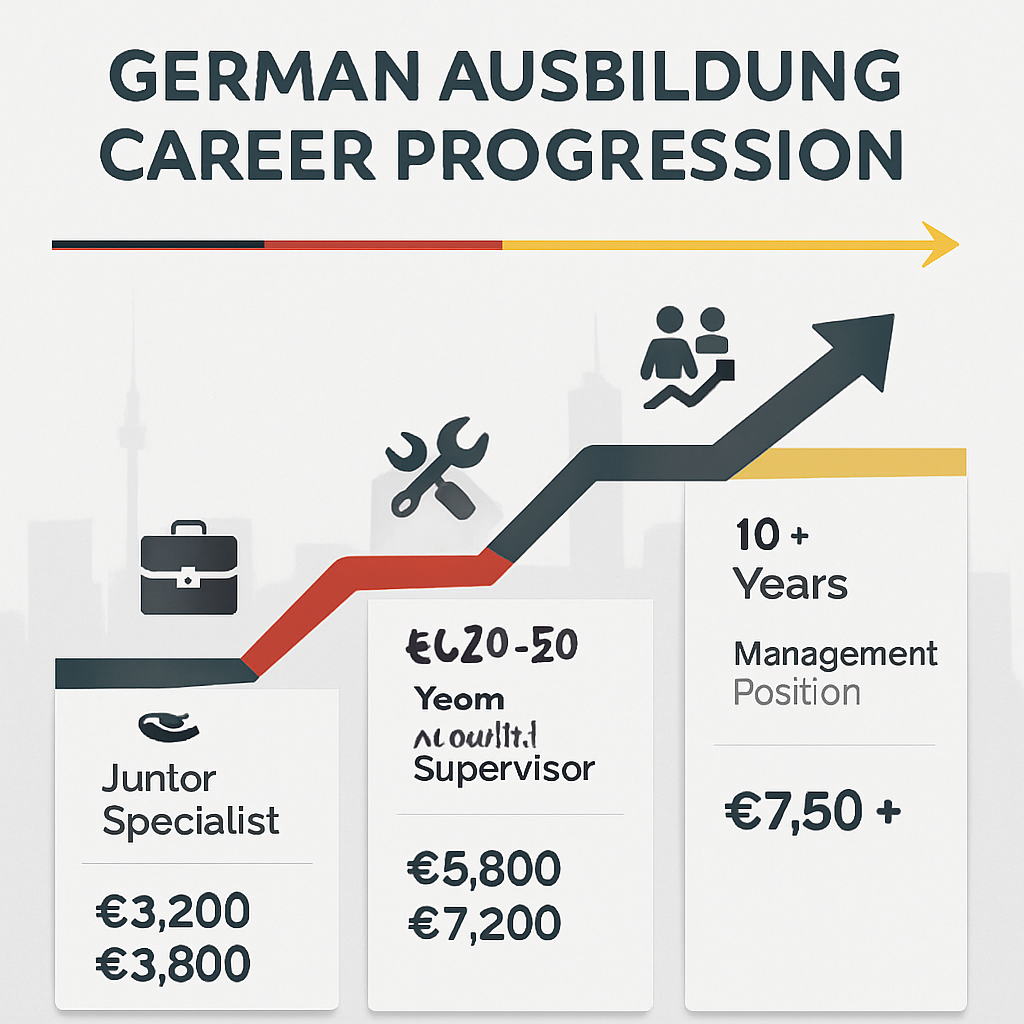
| Field | Entry Level | 5-Year Mark | 10-Year Potential |
|---|---|---|---|
| Automotive Engineering | €3,400 | €5,200 | €7,800 |
| Healthcare Technology | €3,200 | €4,800 | €6,900 |
| Digital Marketing | €3,600 | €5,800 | €8,500 |
| Renewable Energy | €3,800 | €6,200 | €9,200 |
Many Ausbildung graduates pursue additional qualifications like the Meister certification, equivalent to a bachelor's degree, opening doors to business ownership and senior management roles.
#
Pathways to Permanent Residency and Citizenship
Germany offers clear, structured immigration pathways for skilled professionals, making it particularly attractive for Thai students planning long-term European residence.
Residency Timeline:
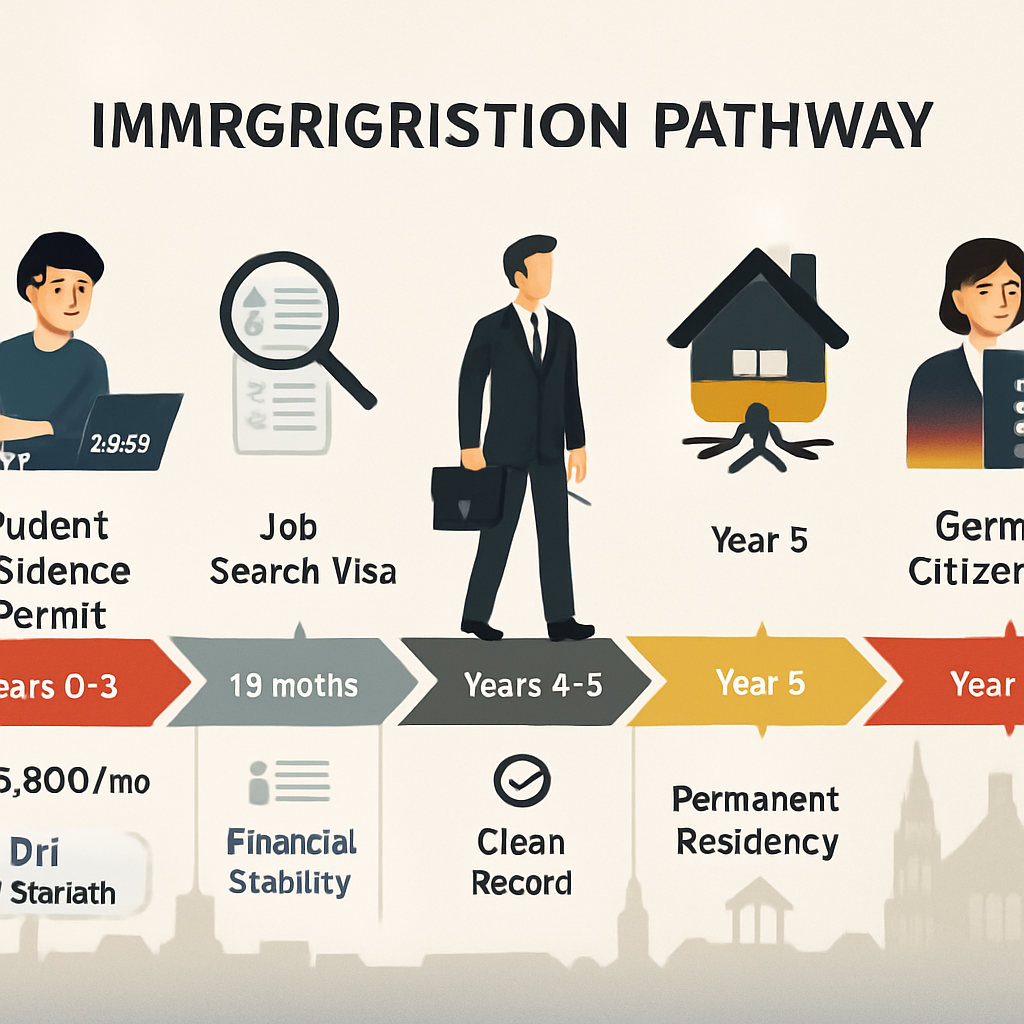
Key Requirements for Permanent Residency:
Citizenship Benefits:
#
Salary Growth Potential in the German Job Market
German vocational graduates experience consistent salary growth throughout their careers, with compensation often exceeding university graduates in similar fields.
Salary Progression Factors:
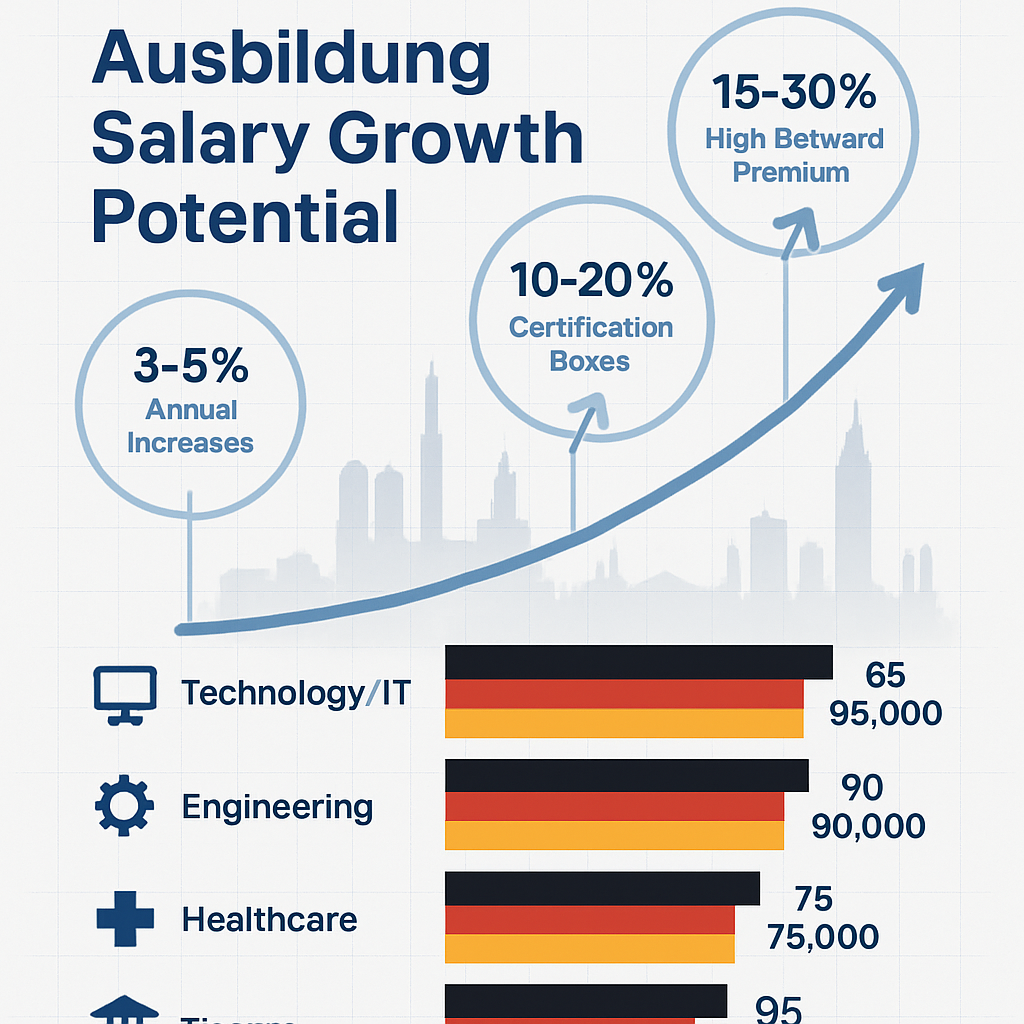
Long-term Earning Potential by Sector:
German workers also benefit from extensive social protections: 6 weeks paid vacation, comprehensive health insurance, pension contributions, and unemployment protection.
Getting Started: Your Action Plan
#
Immediate Steps Thai Students Can Take Today
Beginning your German Ausbildung journey requires strategic planning and systematic preparation. Here's your comprehensive roadmap:
Phase 1: Assessment and Preparation (Months 1-3)
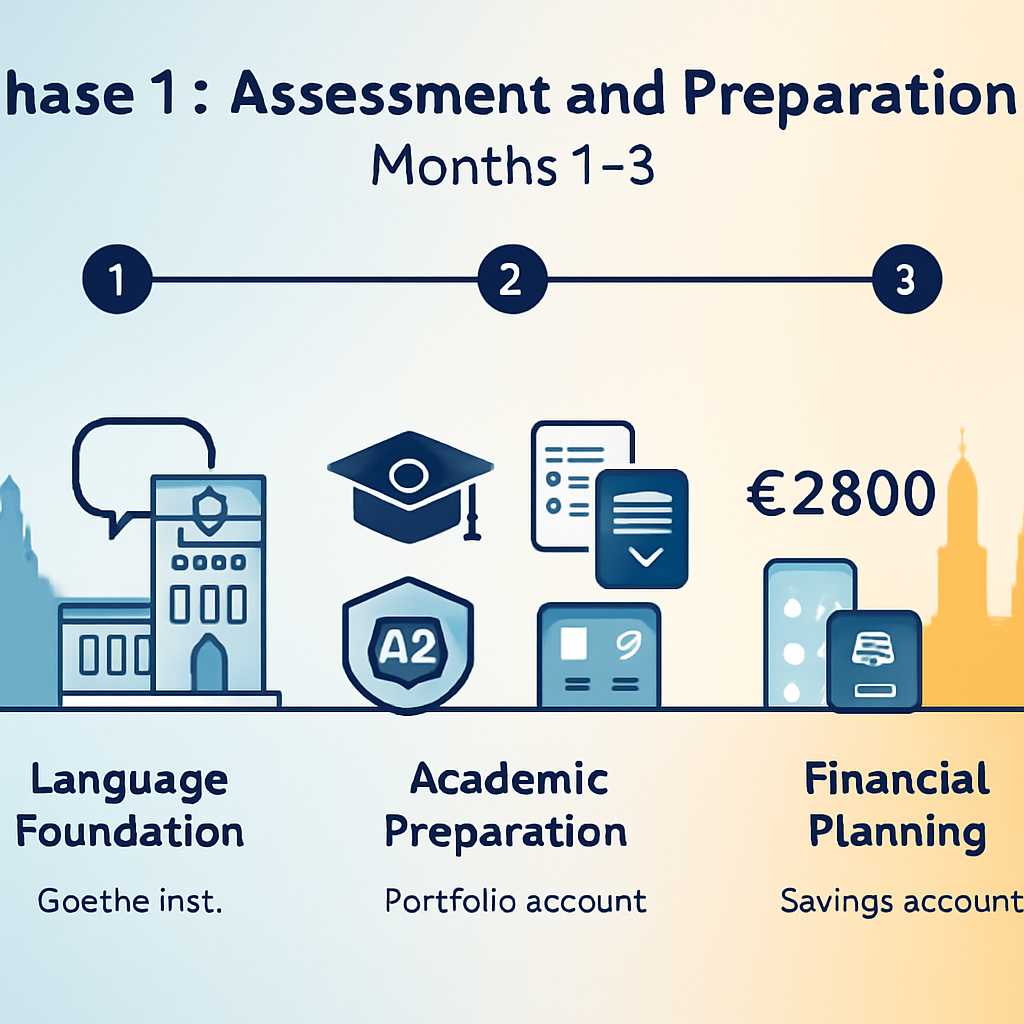
#
Resources and Contacts in Bangkok for Guidance
Official German Institutions:
Educational Consultants:
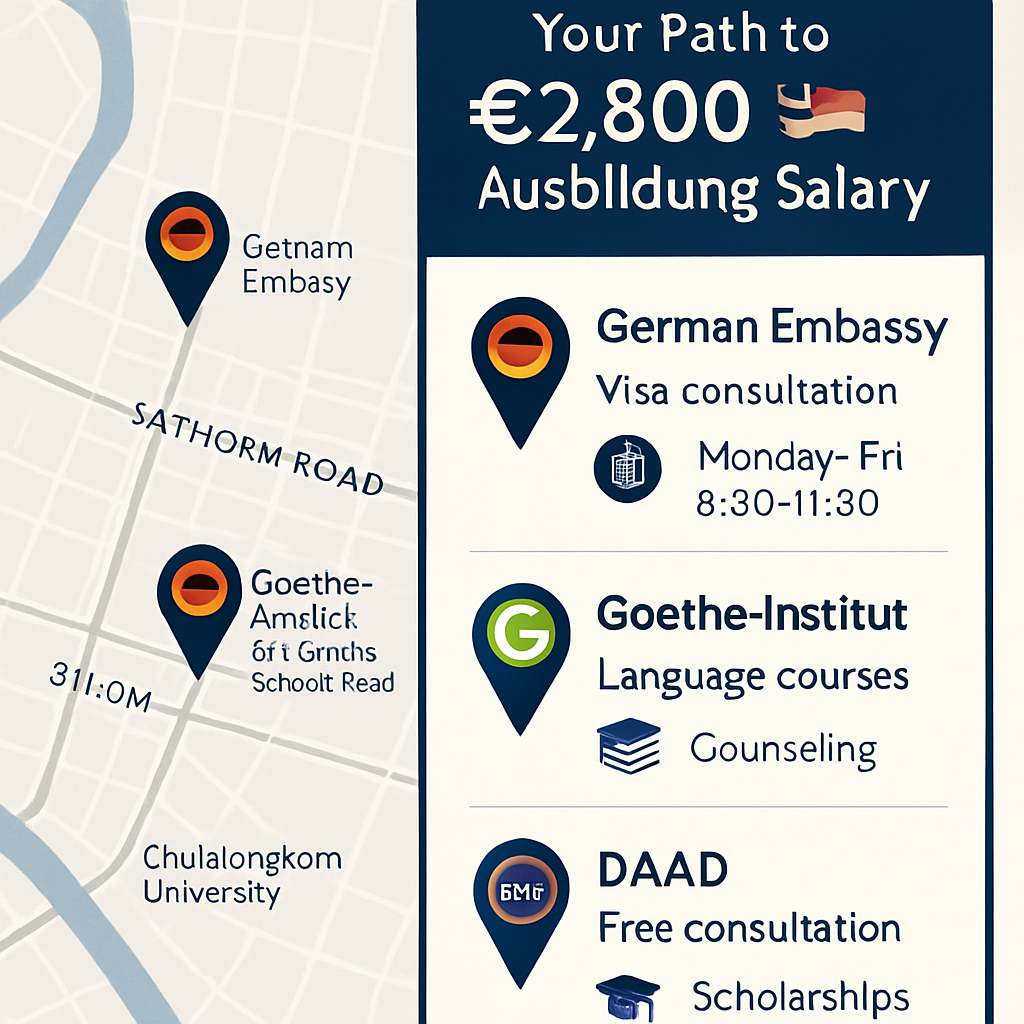
Thai-German Business Networks:
#
Timeline for Application and Preparation
18-Month Preparation Schedule:
Months 1-6: Foundation Building
Months 7-12: Application Phase
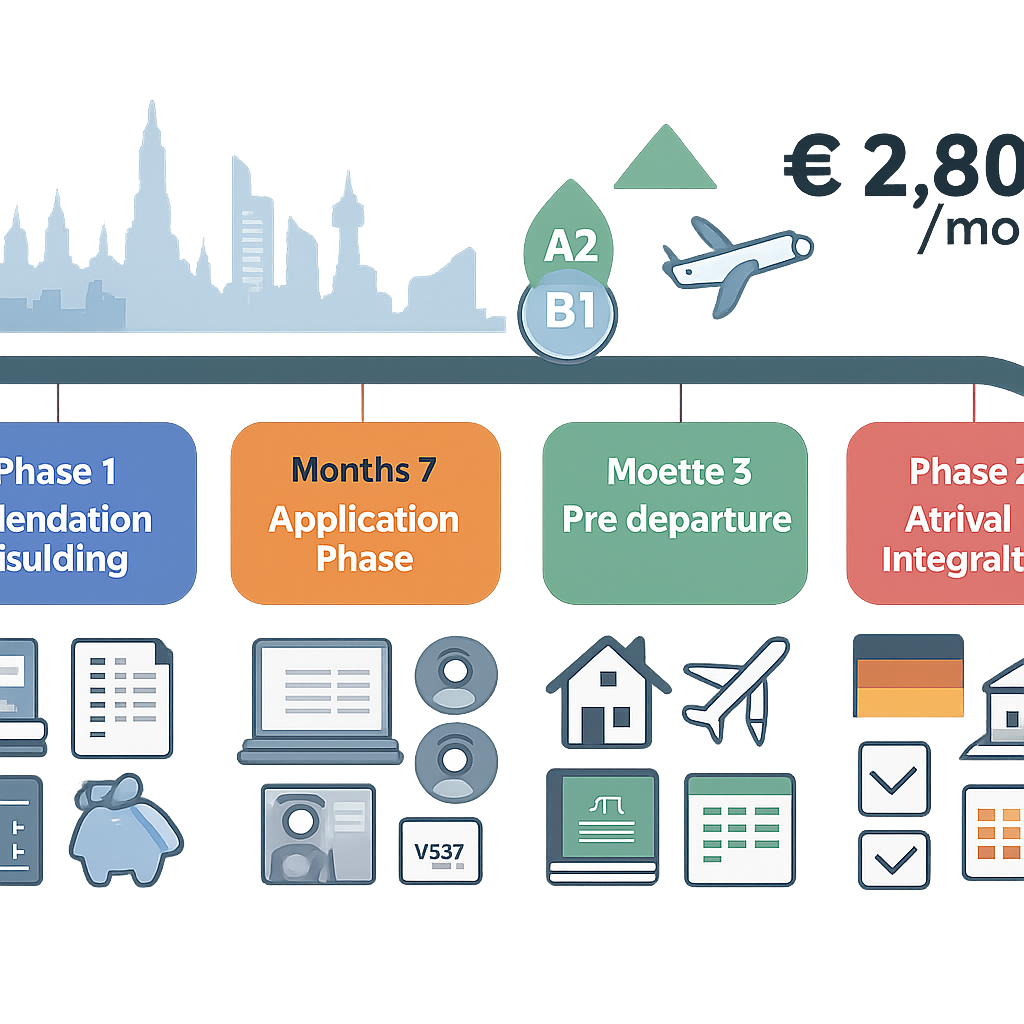
Months 13-15: Pre-departure
Months 16-18: Arrival and Integration
Critical Application Deadlines:
Success requires consistent effort and early planning, but thousands of international students successfully navigate this process annually, with Thai students showing particularly high acceptance rates due to strong technical education backgrounds.
Frequently Asked Questions
#
Question 1: What are the minimum German language requirements to start an Ausbildung program?
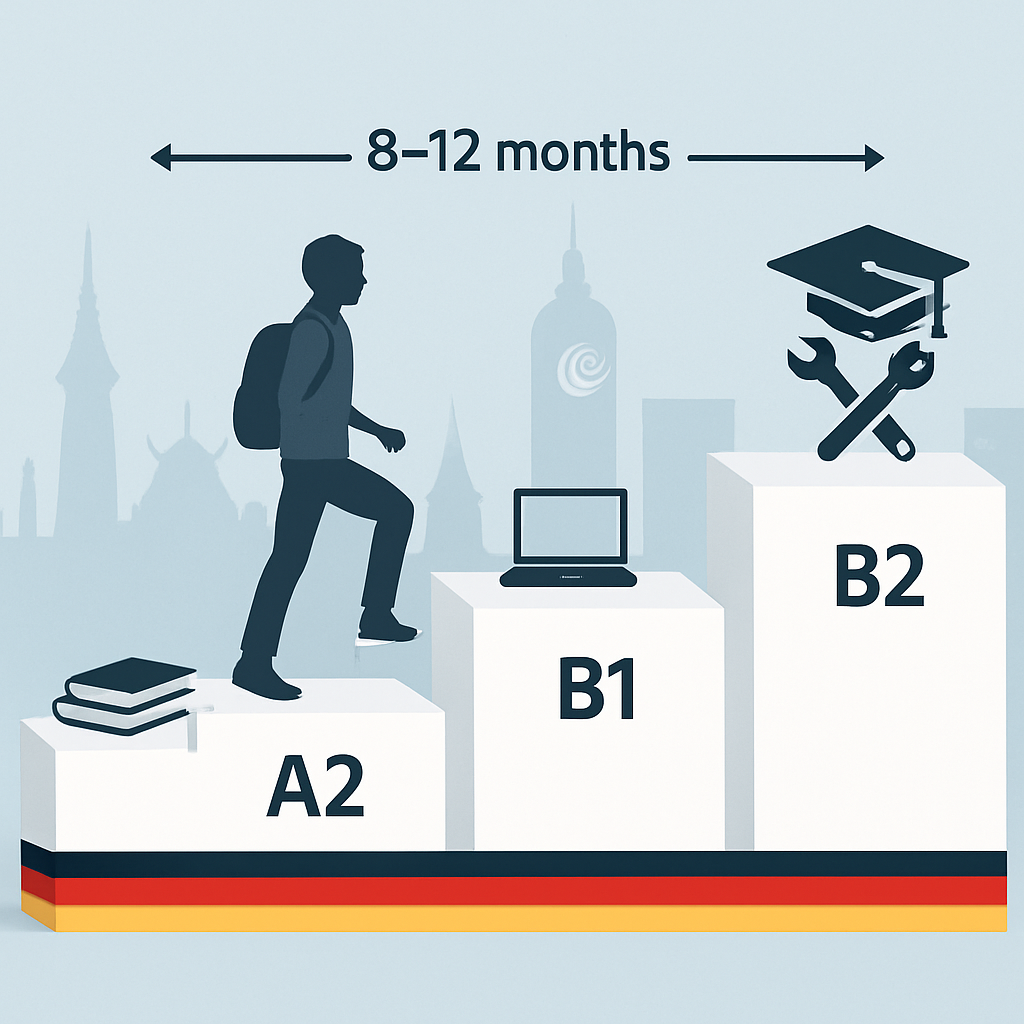
Most Ausbildung programs require B1-B2 German proficiency (CEFR). However, some technical programs accept A2 level with intensive language support during the first year. The Goethe Institute in Bangkok offers accelerated courses specifically designed for Ausbildung candidates. Many Thai students achieve B1 level within 8-12 months of intensive study. Some German companies also provide pre-arrival online language training. It's crucial to start German lessons at least one year before applying. Consider enrolling in evening classes while completing your current studies in Thailand to maximize preparation time.
#
Question 2: How much money do I need to save before moving to Germany for Ausbildung?
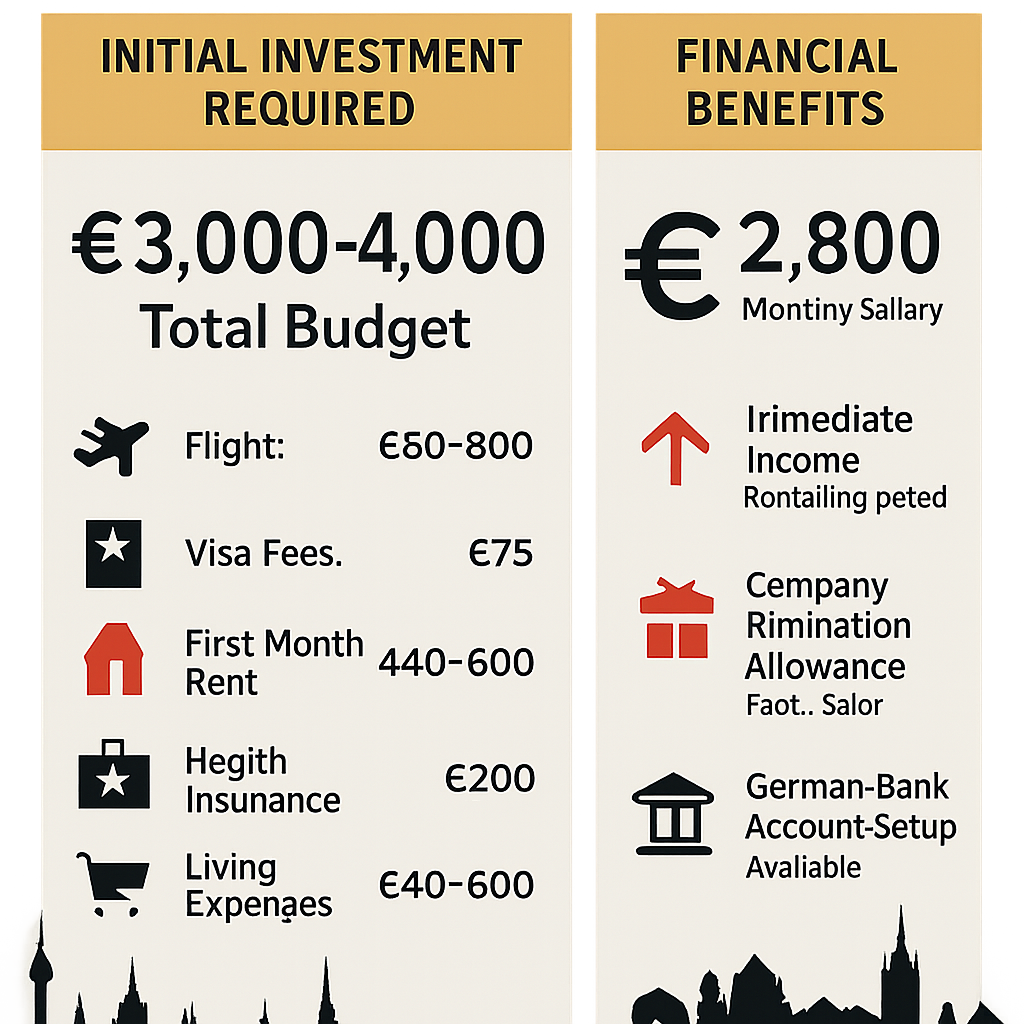
Budget approximately €3,000-4,000 for initial expenses. This includes visa fees (€75), flight tickets (€600-800), first month's accommodation (€400-600), health insurance deposit (€200), and living expenses for the first month before receiving your salary. Many programs offer accommodation assistance, reducing initial costs. Some German companies provide relocation allowances of €500-1,000. Unlike university students, Ausbildung participants start earning immediately, making the financial burden significantly lighter than traditional study abroad programs. Consider opening a German bank account online before departure to streamline the transition process.
#
Question 3: Can I apply for Ausbildung programs while still studying at a Bangkok university?
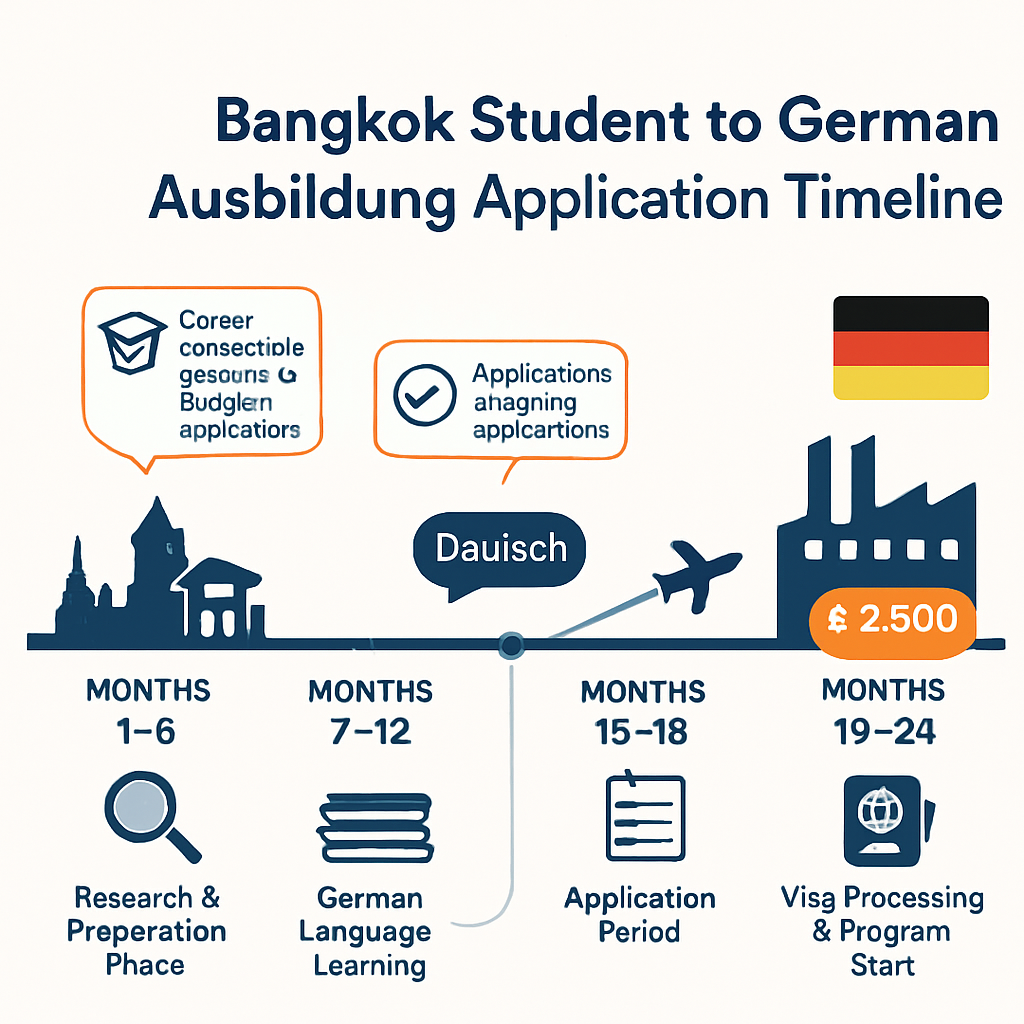
Yes, most students apply during their final semester or immediately after graduation. Applications typically open 12-18 months before program start dates. This timeline allows you to complete German language requirements and visa processing. Many Bangkok universities have career counselors specifically trained in German Ausbildung applications. Some programs accept applications from students in their third year, with conditional acceptance pending graduation. Early application increases your chances of securing preferred programs and companies. Start researching and preparing applications at least 18 months before your intended start date for optimal positioning.
#
Question 4: What happens if I don't perform well during the Ausbildung program?
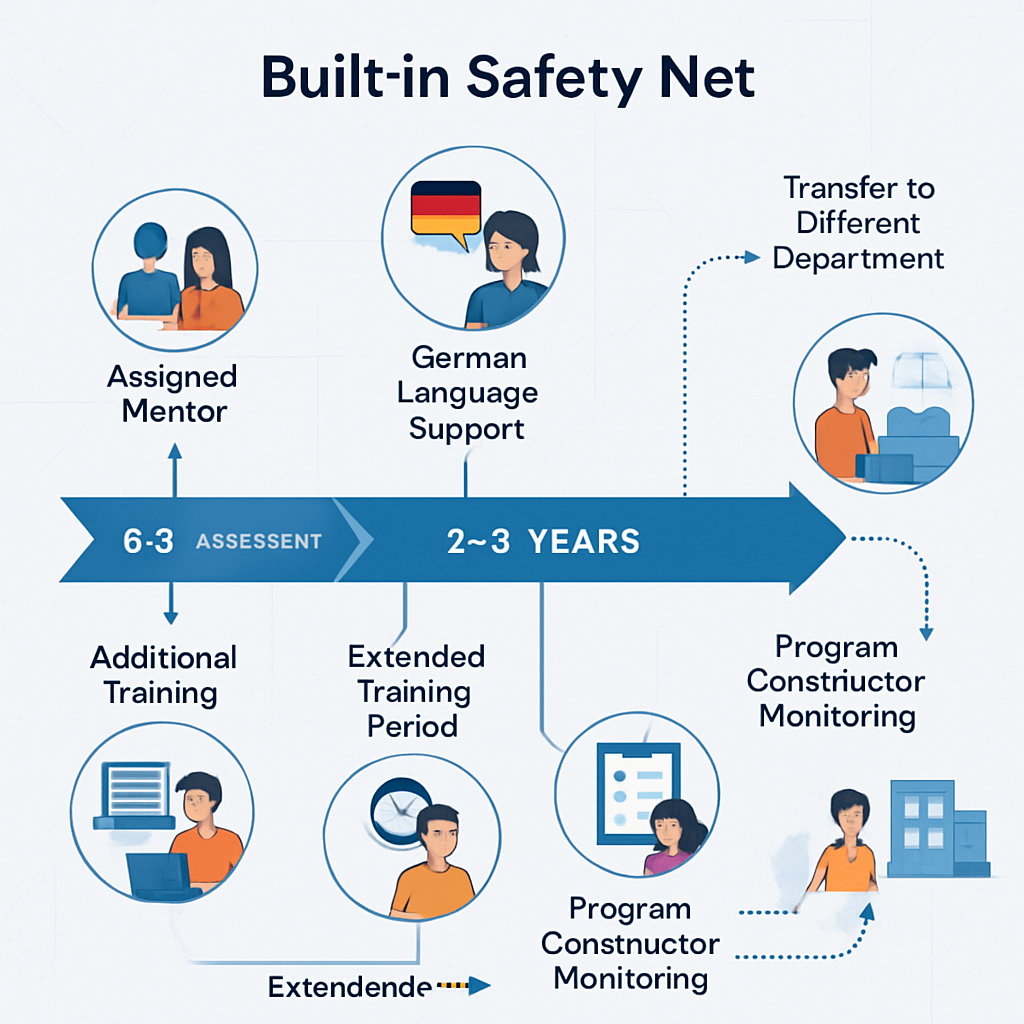
German Ausbildung programs include comprehensive support systems. Most companies assign mentors and provide additional training if needed. The dual education system allows for practical application of theoretical knowledge, often making learning easier than traditional classroom settings. If struggling, you can request additional German language support or extended training periods. Program coordinators regularly monitor international students' progress. In rare cases of program mismatch, transfers to different departments or companies are possible. The structured 2-3 year timeline includes built-in assessment periods, ensuring adequate support before any performance concerns become critical issues.
#
Question 5: How does the work schedule balance between company training and classroom education?
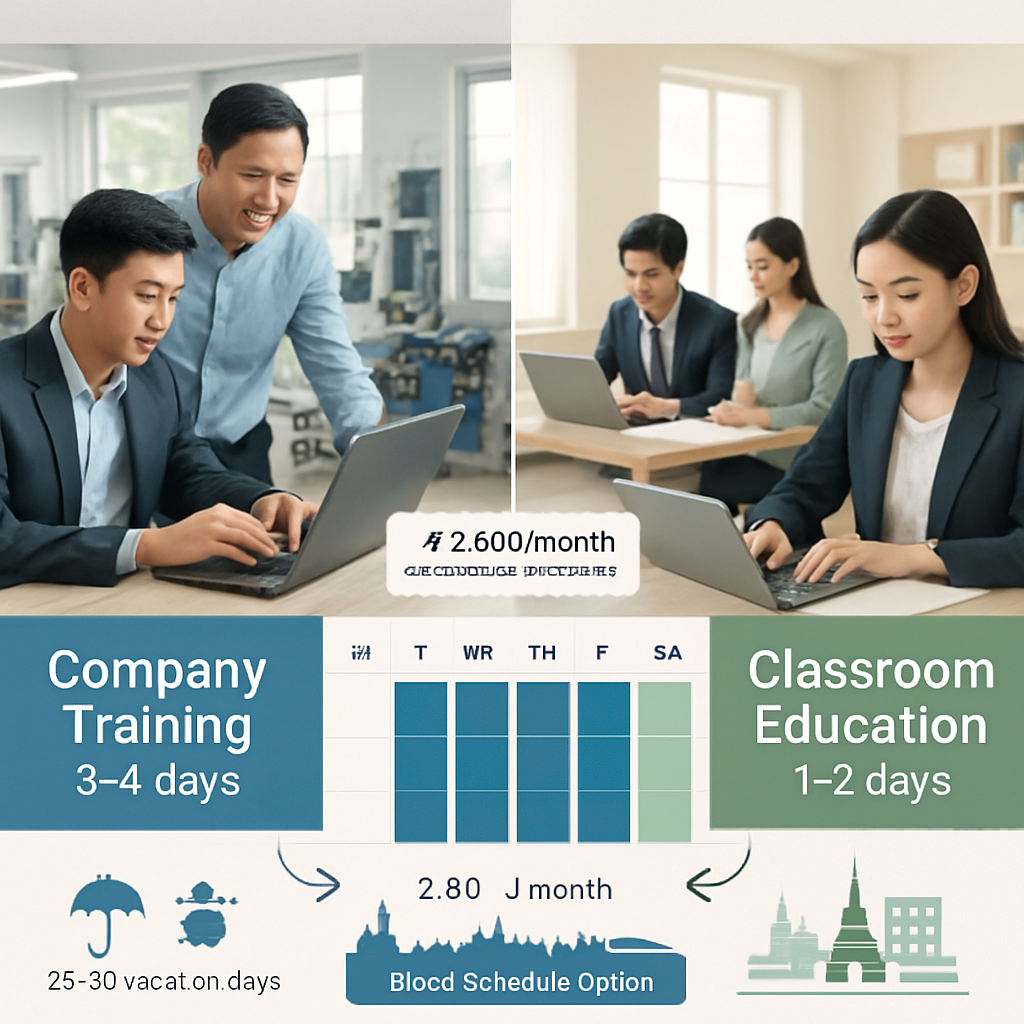
Most Ausbildung programs follow a 3-4 day company training and 1-2 day school schedule weekly. Some programs use block scheduling with alternating weeks of intensive classroom study and full-time company work. Daily schedules typically run 7:30 AM to 4:30 PM, similar to standard Thai office hours. The practical training directly relates to classroom theory, making both components more engaging and relevant. You'll receive full salary during both company and school days. Vacation time (25-30 days annually) is scheduled around both company needs and school calendars, ensuring balanced work-life integration throughout the program.
#
Question 6: Are there specific Ausbildung programs that don't require strong technical backgrounds?
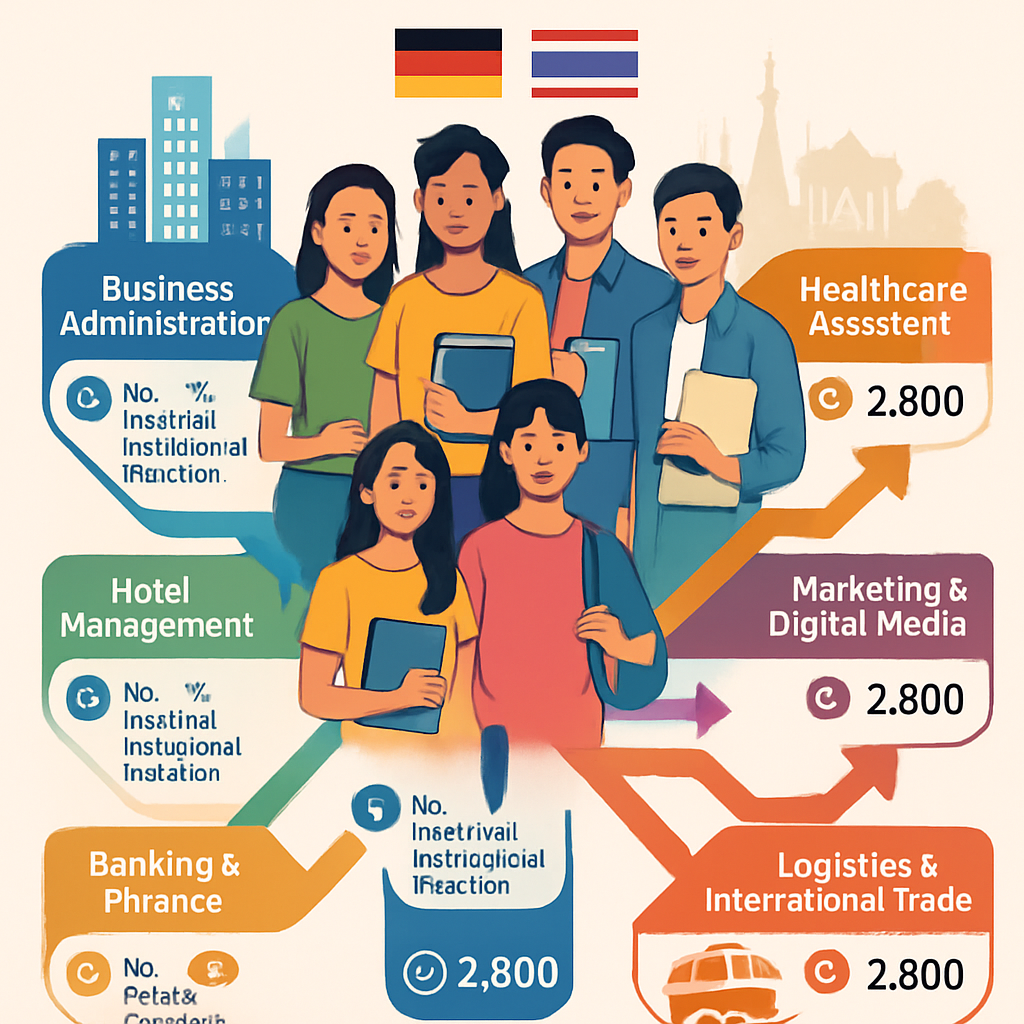
Yes, many programs welcome students from diverse academic backgrounds. Business administration, hotel management, logistics, and international trade programs particularly value multilingual Thai students. Healthcare assistant roles (with additional certification) offer excellent opportunities. Banking and finance Ausbildung programs often prefer candidates with strong analytical skills over specific technical knowledge. Marketing and digital media programs actively seek international perspectives. The key is demonstrating motivation, adaptability, and basic German proficiency rather than specialized technical expertise. Many programs provide foundational technical training during the first semester, making them accessible to students from various educational backgrounds.
#
Question 7: What career progression opportunities exist after completing Ausbildung?
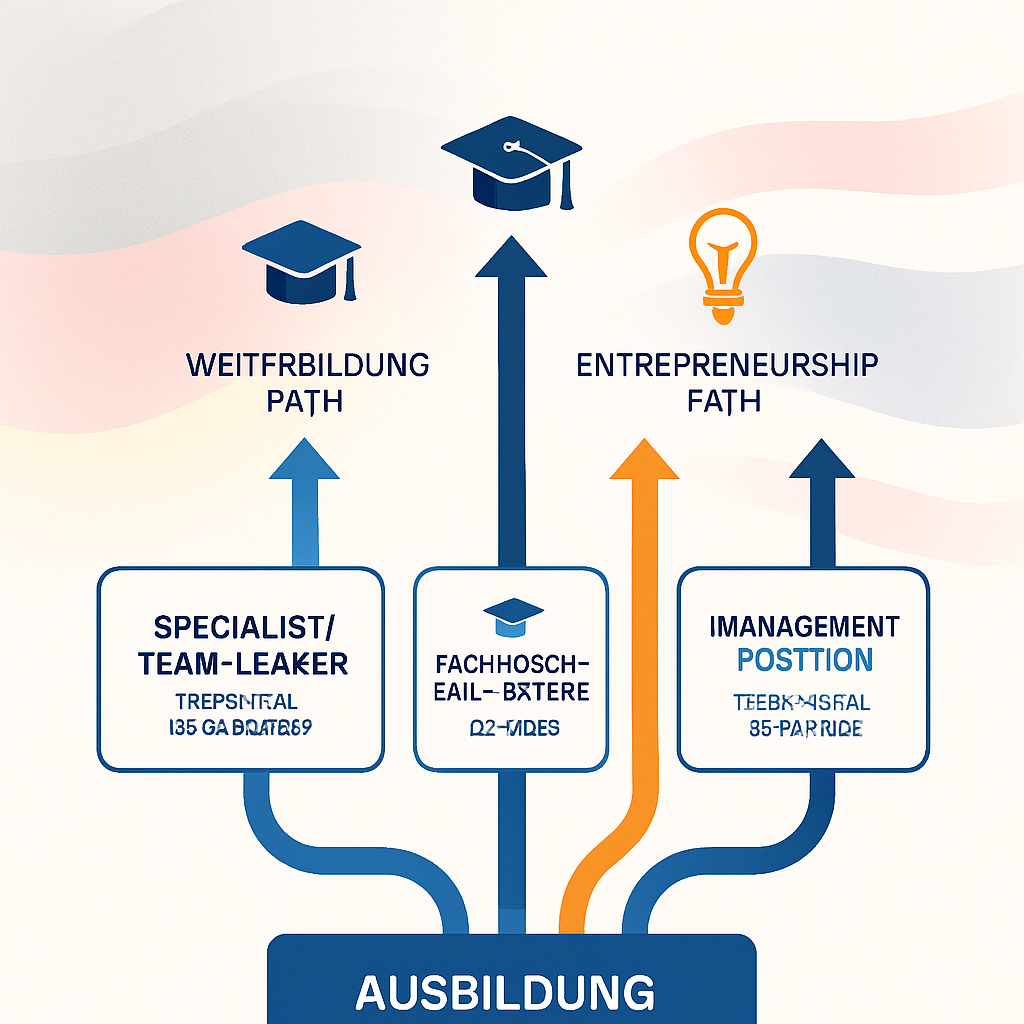
Ausbildung graduates can pursue multiple advancement paths. Many continue with "Weiterbildung" (continuing education) to become specialists or team leaders, often sponsored by employers. University pathway options include "Fachhochschule" programs, allowing degree completion in 2-3 years instead of traditional 4-year programs. Entrepreneurship opportunities exist, particularly for those understanding both German and Southeast Asian markets. Many graduates establish import-export businesses leveraging their bicultural expertise. Career advancement within German companies is common, with many Thai Ausbildung graduates reaching management positions within 5-7 years. The combination of practical skills, cultural competency, and language abilities makes graduates highly valuable in Germany's international business landscape.
#
Question 8: How can I maintain connections with family and friends in Thailand while in Germany?

Modern technology makes staying connected easier than ever. Most Thai students use LINE, WhatsApp, and video calling apps regularly. Germany has excellent internet infrastructure supporting high-quality international communication. The 6-hour time difference allows morning calls to Thailand during German evenings. Many German cities have active Thai communities and restaurants, providing cultural connections. Annual vacation time (25-30 days) typically allows for yearly visits home, with some students managing two shorter trips. Thai festivals and cultural events are celebrated in major German cities. Building relationships with other Thai students in Germany creates a supportive network, reducing homesickness while maintaining cultural identity.
Conclusion
The path from Bangkok to Berlin isn't just a geographical journey—it's a transformation that's reshaping the futures of Thai students and opening doors to opportunities that seemed impossible just a few years ago. The evidence is undeniable: while traditional Thai graduates often struggle with starting salaries of ฿15,000-25,000 monthly, Bangkok students entering German Ausbildung programs are earning €2,800 (approximately ฿110,000) from day one, with guaranteed career progression and European work experience that makes them globally competitive. This isn't just about money—it's about accessing a world-class education system that combines theoretical knowledge with hands-on expertise, creating professionals who are immediately valuable in today's economy.
The success stories emerging from Bangkok universities partnering with German companies prove this isn't just theoretical—it's happening right now. Students from Chulalongkorn, Thammasat, and other leading institutions are already building careers in Germany's thriving industries, from advanced manufacturing to digital technology. What makes this particularly exciting is that the German Ausbildung system is specifically designed to welcome international talent, with structured support systems, language training, and clear pathways to permanent residency. The Thai-German Education Bridge has created an unprecedented opportunity for students who are willing to think beyond conventional career paths.
Your next steps are straightforward but time-sensitive. Start by researching specific Ausbildung programs that align with your interests—whether in engineering, IT, healthcare, or business. Begin German language learning immediately, as this will be your key to unlocking opportunities. Most importantly, don't let uncertainty or fear of the unknown hold you back. Every successful student featured in this article started exactly where you are now: curious, perhaps uncertain, but ready to take action.
The window of opportunity is open, but it won't remain that way forever. German companies are actively seeking motivated international students, and the infrastructure to support your journey is in place. Connect with GoAusbildung's expert advisors today to get personalized guidance on program selection, document preparation, and application strategy. Your €2,800 monthly salary and European career are waiting—but only if you take the first step. Contact GoAusbildung now and transform your potential into your reality.
About GoAusbildung
Comprehensive resource for guidance on Ausbildung programs in Germany
Ready to Start Your Ausbildung Journey in Germany?
Explore our resources and get personalized guidance to find the perfect Ausbildung program aligned with your career goals.